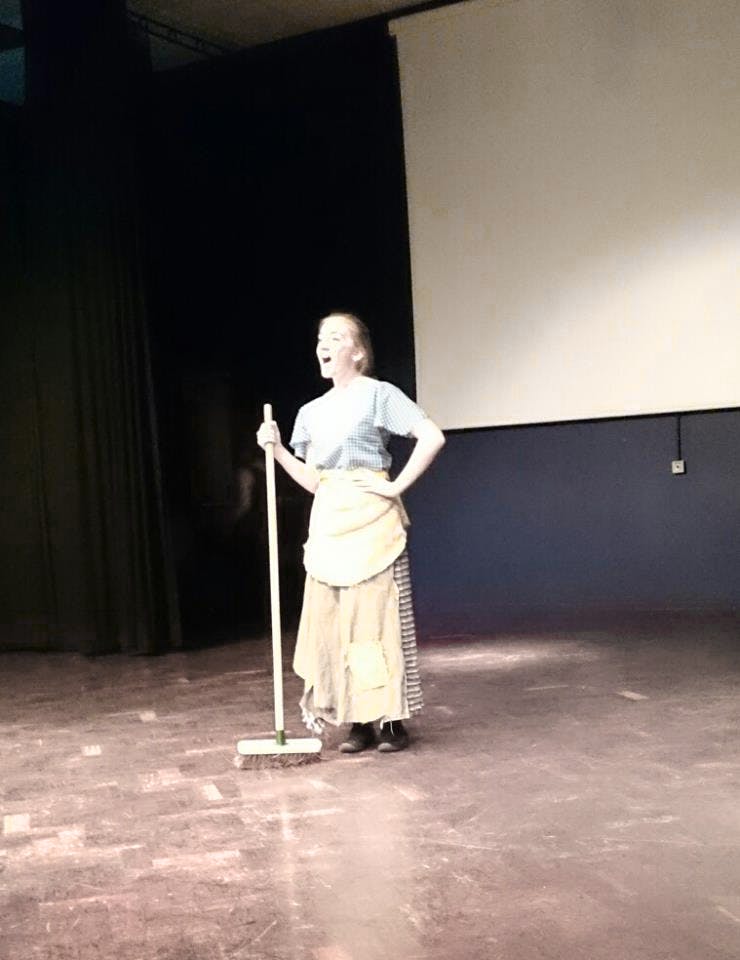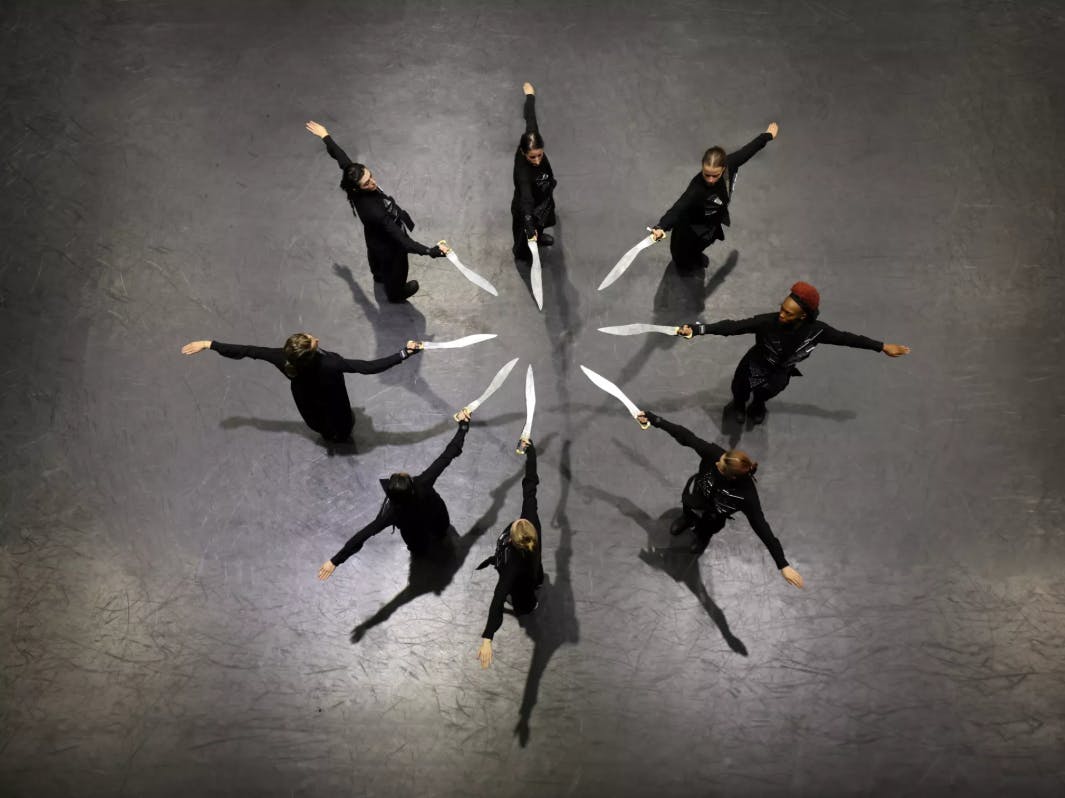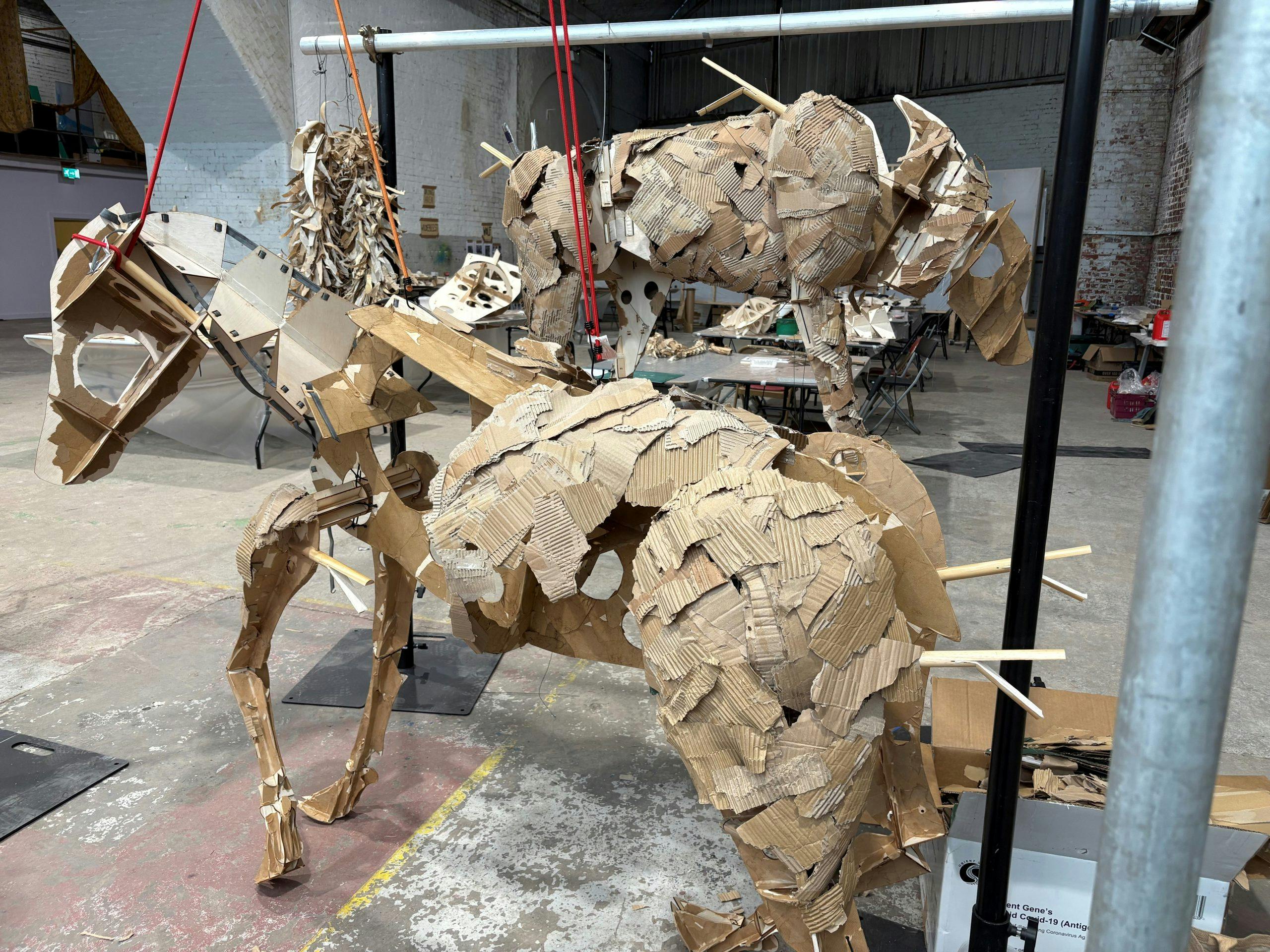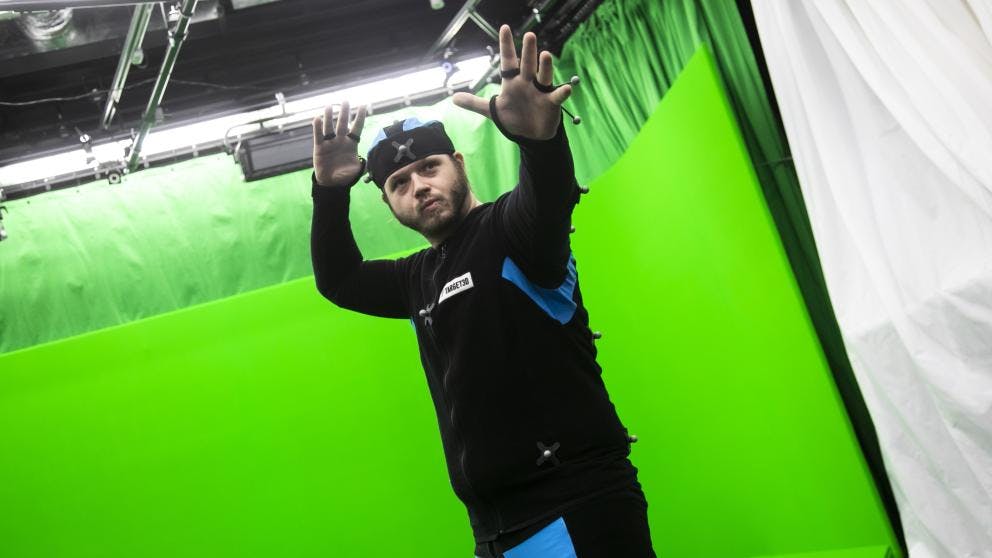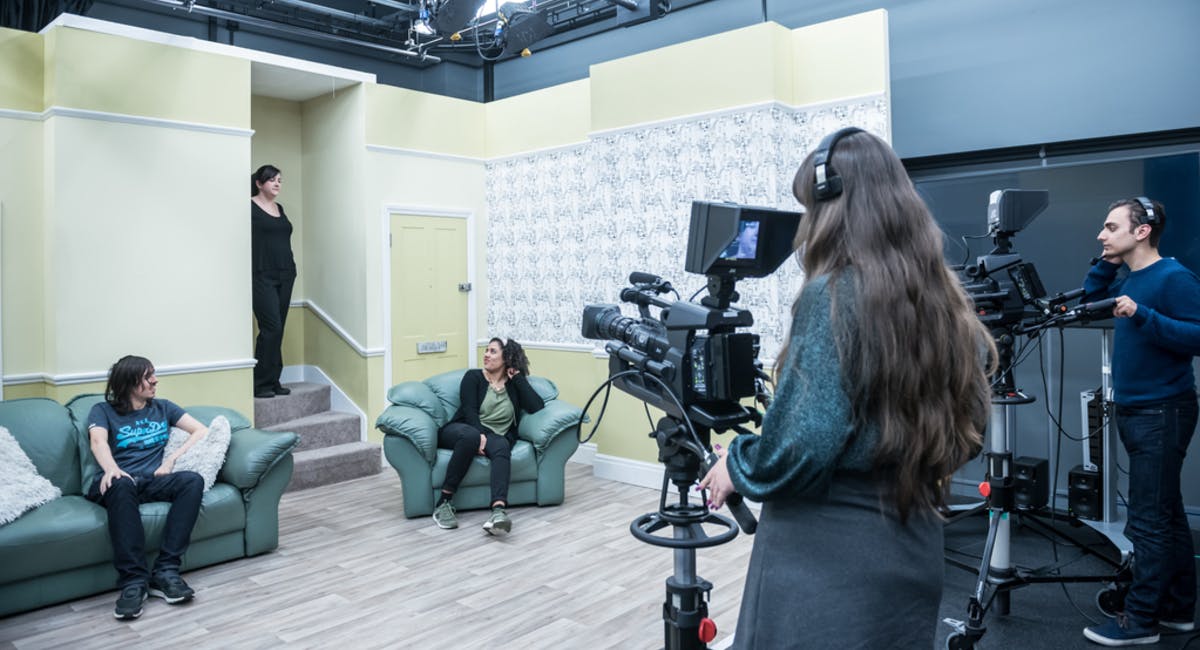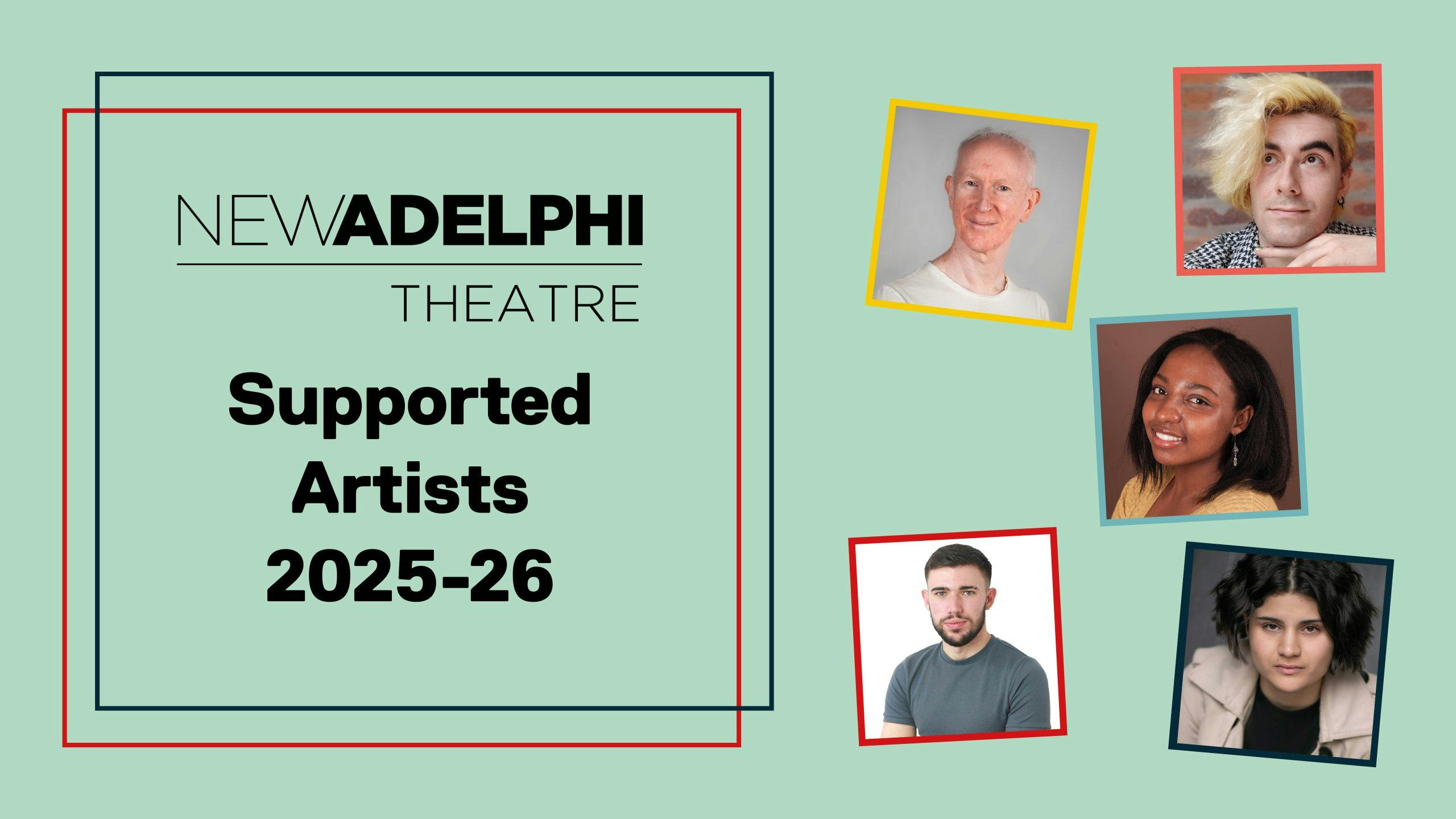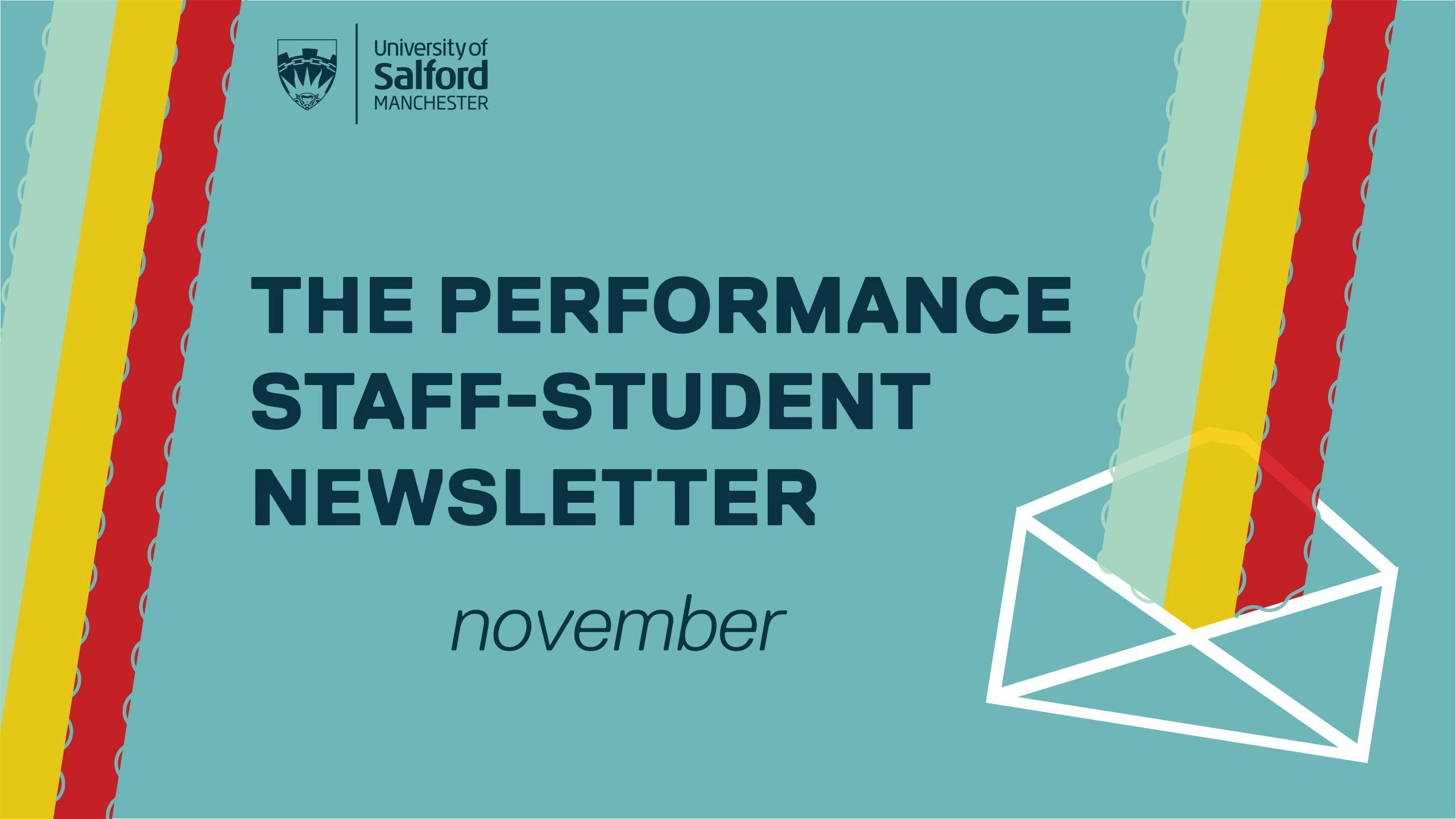
Hello, and welcome to the latest edition of the Staff/Student Newsletter for Performance!
As this is the first issue of the new academic year, we would also like to offer a HUGE WELCOME to our new Level 4 students! We hope you’re settling in well and taking advantage of all the academic, cultural, and social opportunities that Salford has to offer. The Staff/Student Newsletter is where we showcase the amazing things that are happening in our Performance community. So, please let us know about any projects you’re working on, shows you’re taking part in, or content you’re producing. We’d love to feature it!
In this edition of the newsletter, we’ve got details of Chloe Gorrod’s (TaPP L4) Between Earth and Voice project, a chat with TikTok sensation (and Salford student) Jason Davenport (MaP L6), as he discusses his rise to fame in social media, info on the free Stage Combat course, plus details of the exciting international project that L6 TaPP students are taking part in this winter. If that wasn’t enough, we’ve also got news of Richard Talbot’s research trip to Japan, Ali Matthews’ performance in Marina Abramović’s Balkan Erotic Epic, Abby Bentham’s work on the climate action and public art initiative The Herds, details of our career-launching Graduate Scholarships, and much, much more.
There’s also a round-up of what’s on at the local theatres so you can be sure not to miss any of the incredible work currently being showcased in Manchester. Don’t forget to check out our Guess the Technician feature, either – can you guess who it is?
Take care,
Abby and Bron 😊
Abby Bentham: A.A.Bentham@salford.ac.uk
Brainne Edge: B.Edge@salford.ac.uk
SALFORD STUDENT SOCIAL MEDIA STAR!
We talk to TikTok sensation (and Salford student) Jason Davenport, as he discusses his rise to fame in social media, ending with some hints and tips in the field.
You can find Jason on social media here, and you can find all episodes of the podcast here.
SHOW ME THE FUNNY!
“Apparently one in five people in the world are Chinese. And there are five people in my family, so it must be one of them. Its either my mum or my dad or my older brother Colin. Or my younger brother Ho-Chan-Chu. But I think it’s Colin.”
– A joke by Tim Vine, submitted by Alfie Naylor L6 Theatre and Performance Practices
TRACES OF UNDERGROUND THEATRE AND PHYSICAL COMEDY IN JAPAN
– Dr Richard Talbot, Senior Lecturer in Performance
In SAMCT several of us have research interests in East Asian Performance and Media culture such as Manga, Yōkai, Anime, Comedy, Contemporary Performance, and Film. In the last three years, we have hosted contemporary Japanese and Korean performances, workshops and seminars in New Adelphi, attended by practitioners from the Northwest and beyond, as well as the general public. Our online writing workshops in June for researchers of Japanese comedy in June were attended by scholars from 24 universities from Cambridge to Waseda.
This summer I was able to catch up with one of our workshop leaders, Yuta Hagiwara, director of Kamome Machine, in Tokyo. He took me to see some traces of ‘Underground’ Theatre (angura) in Shinjuku, before I travelled up to the Japanese Alps to meet a leader of 1960s radical theatre, Tadashi Suzuki, and witness performances in the Suzuki Company of Toga (SCOT) Summer Season. This note for the newsletter is a flavour of that visit, but also an invitation to contact me if you have Japan-related projects that you would like to develop.
All Theatre and Performance Practice students will have encountered Anne Bogart in connection with Viewpoints Training. Anne Bogart, Ellen Lauren and Tadashi Suzuki co-founded the Saratoga International Theatre Institute (SITI) in 1992. SITI was a major catalyst in promoting training that combines Viewpoints and the Suzuki Method of Actor Training (SAMT). Every year hundreds of actors apply for the SMAT summer training. Those selected make the pilgrimage to Toga, in the Japanese alps. I have not seen my teacher Ellen Lauren since I trained in 1992, so I was thrilled that she was performing in Dionysus in this Summer Season.
A quick background: Japanese Angura theatre emerged in the 1960s, alongside growing unrest around the world amongst a generation of students appalled by the Vietnam war. In Japan, ideological battles led by the left also focussed on the terms of the postwar treaty with America which many thought needed urgent revision. Postwar Shingeki theatre makers were absorbed in the methods of a modernist literary theatre in Europe and understood theatre as a vehicle for political resistance and revolution. Angura was epitomised by the work of director Kara Jūro, while theatre and filmmaker Terayama Shūji, explored Situationist or avant-garde alternatives. Tadashi Suzuki’s early work is often listed by theatre historians alongside that of Jūro, Shuji, plus Satō Makoto (Theatre Centre 67/68, The Black Tent) and Ōta Shōgo (Tenkei-Gekijo). Jūro revisited the popular storytelling of Kabuki, alongside a fantastical, ‘kitsch’ irrationality. Suzuki’s work revisited training methods from Noh and Kabuki, traditional theatre techniques that signalled a return to actor-centred theatricality, a radical break from the realism and structure of Shingeki.
Key Locations
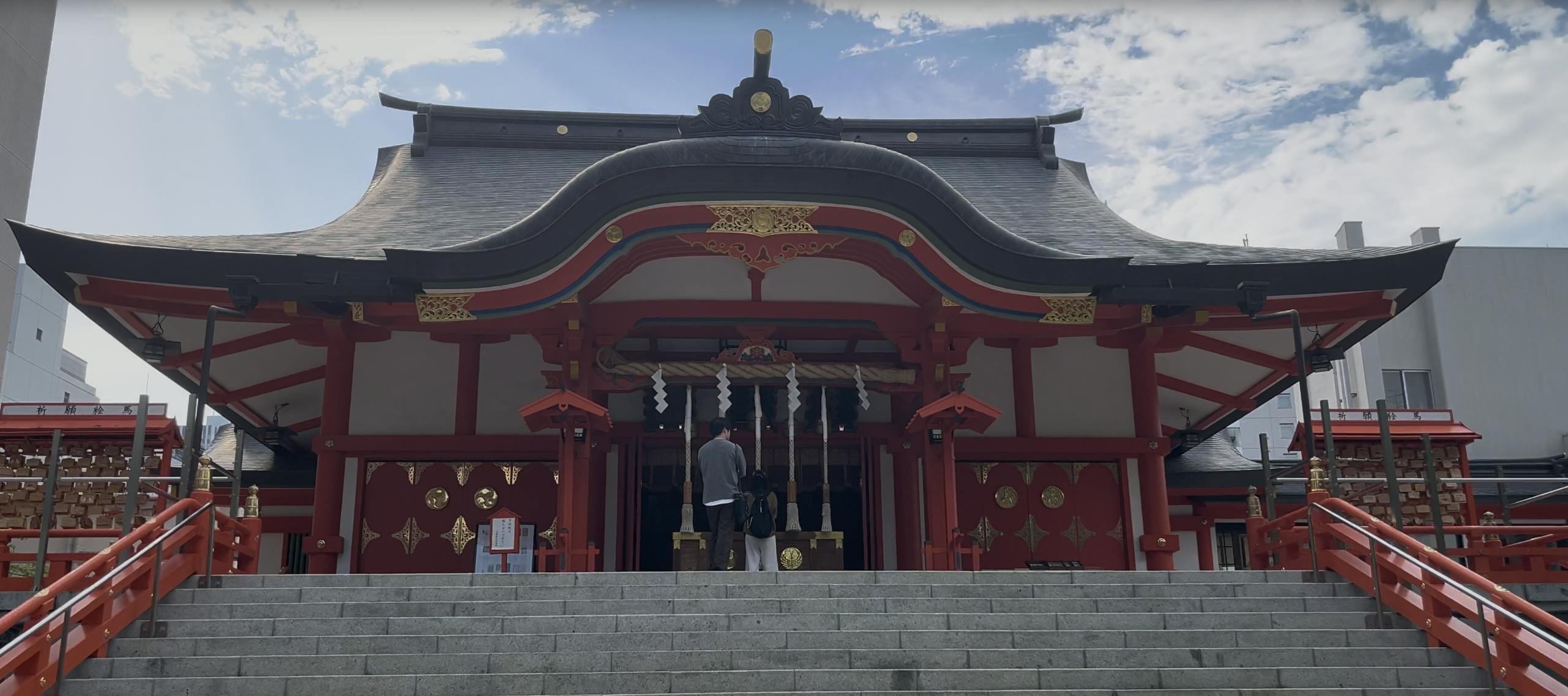
The grounds of Hanazono shrine, Shinjuku, sheltered the pop-up Red Tent of Kara Jūro’s Situation Theatre (Jōkyō Gekidan) when the police shut down angura performances because of their association with student protests. When Kara Jūro died in May 2024, The Red Tent was still touring Japan including to the grounds of this shrine. Nearby, Shinjuku’s Golden Street, Goruden Gai, is 6 narrow streets with cramped bars that used to be the hangout for many creative people connected with angura in photography, film making, theatre and literature. By some miracle it survives, although dwarfed now by Shinjuku’s skyscrapers.
I had hurtled to Japan by plane, and after the tour of Shinjuku, headed onto the Shinkansen Northwest from Tokyo. My long journey to the Suzuki company base in the mountains of Toyama forced me to slow right down. Up there, the company combines collective living with daily training exercises and farming pumpkins..
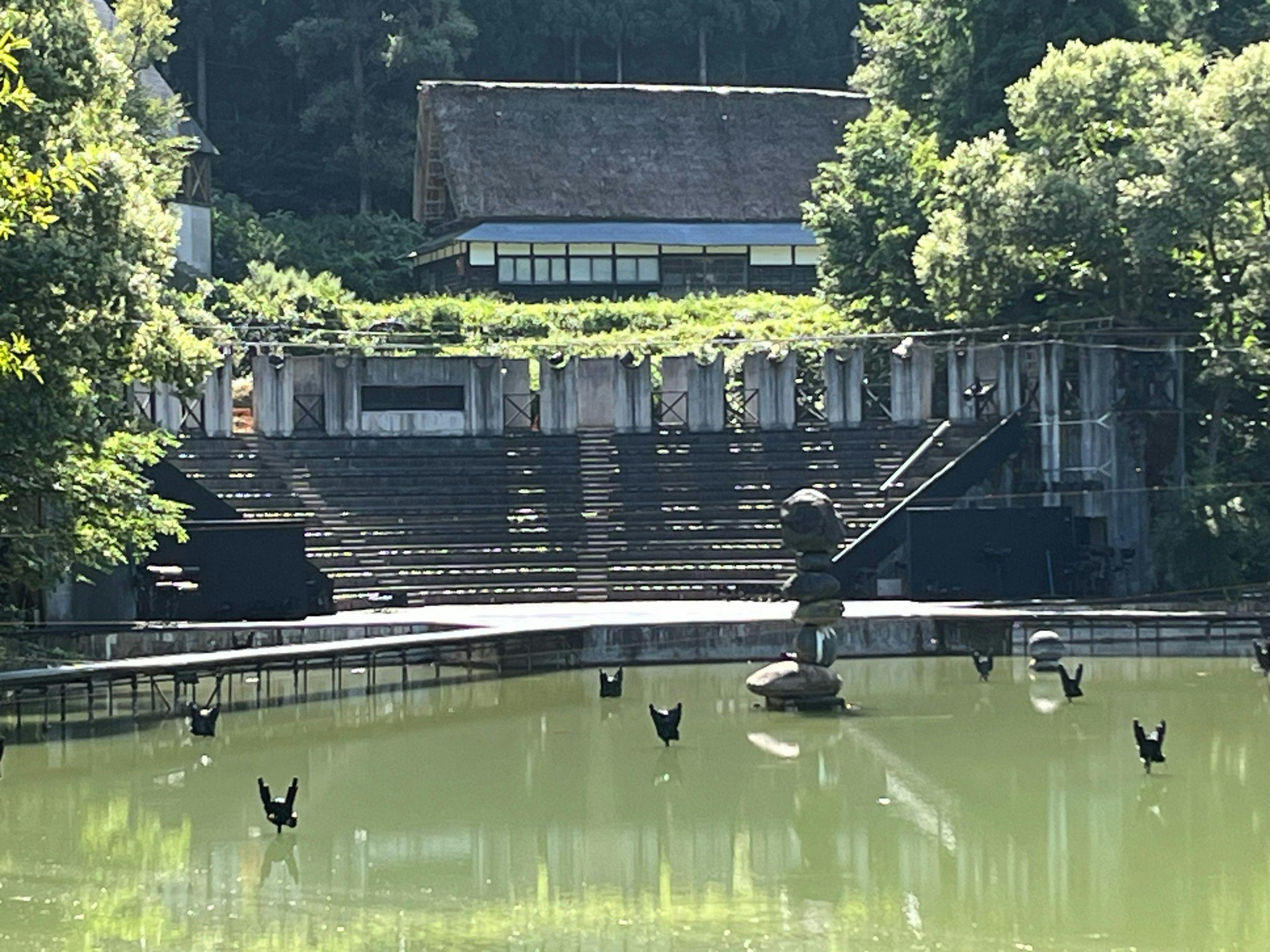
After a stop-start minibus journey along vertiginous bends up the mountain, I was ready for the intense concentration demanded from actors and audience alike. Each week an outdoor performance is punctuated by fireworks that burst over the amphitheatre overlooking a lake. The fireworks are synchronised to match the dramaturgy. Afterwards Suzuki and the local mayor smash huge barrels of sake to share with the audience, along with the pumpkins.
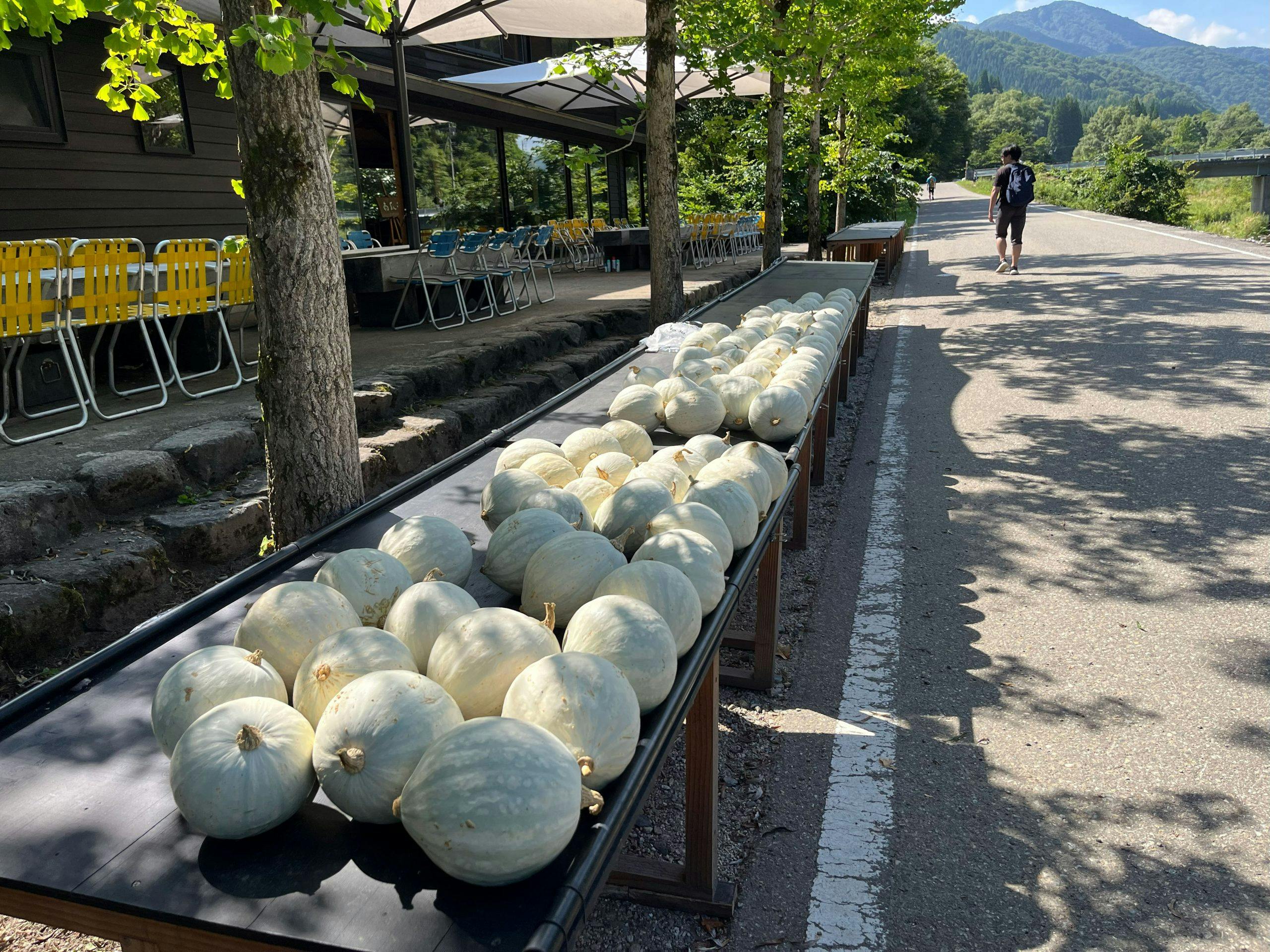
Dionysus, an adaptation of Euripides’ The Bacchae, was performed in a spookily dark farm storehouse.
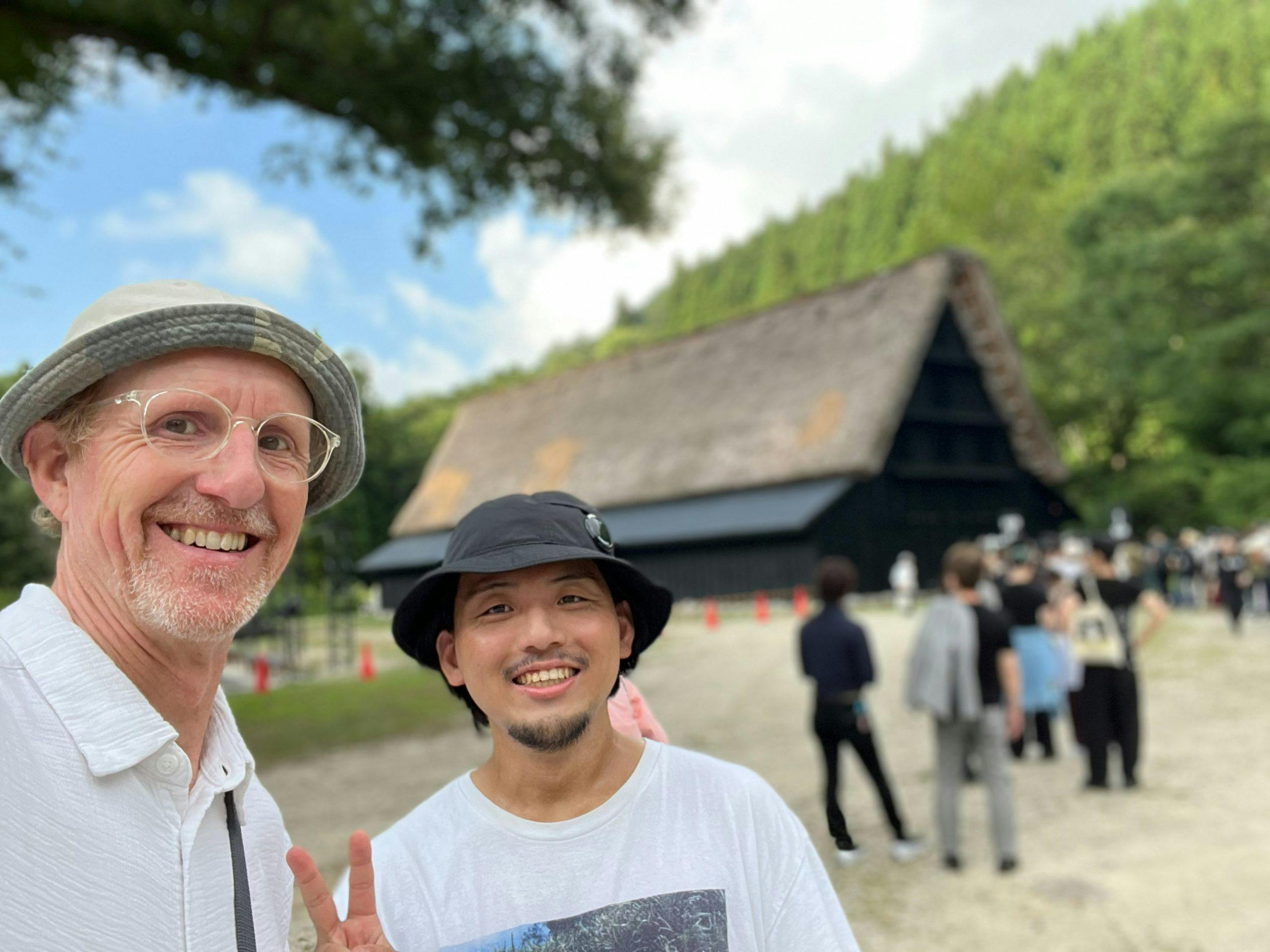
Sight lines were broken by the beams and upright pillars of the Toga theatre’s “praying hands” (gassho zukuri) architecture. Sometimes I could only hear a voice or see a fragment of each actor. Lighting beams shot through grill-bars breaking up the floor space into lines and grids, leaving lines of shadow on performers. This was a deep immersion for me, though I was sitting on a low step in a row of people, craning, trying to avoid blocking the view of people behind. I was disorientated but also wrapped up in the stage action.
Agave enters late into the play Dionysus. She is Queen and mother of Pentheus who has succumbed to a Dionysian spell and lunacy. Ellen Lauren floated like a ghost – using suriashi a foot sliding technique common to Noh theatre – holding out the head of her prey. Agave thinks this is a lion killed while she was hunting. When it finally dawns on Agave that she has executed her son, Lauren, aged 71, leans impossibly far back. The the whole-body trembles, before collecting itself upright in a horrible stillness; her eyes are red and emotion seems to churns in and around the actor, reverberating through the audience. I was holding my breath.
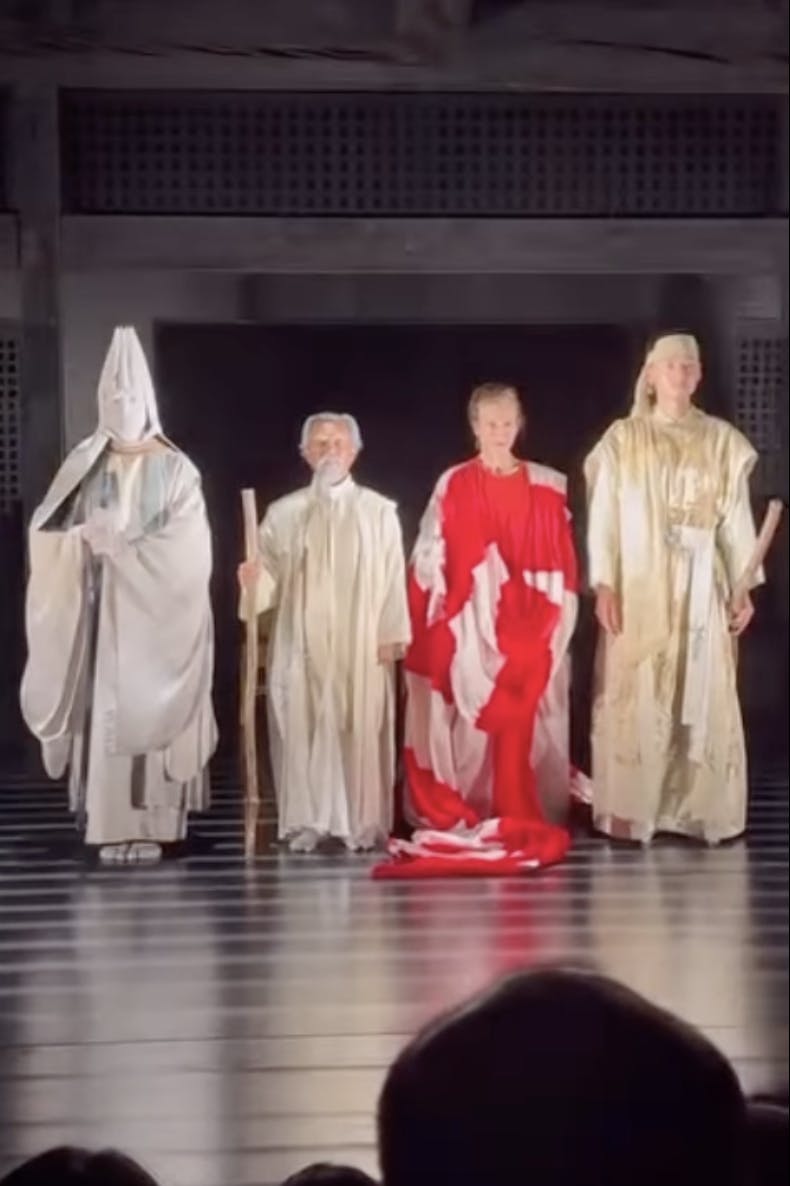
Lauren has collaborated with Tadashi Suzuki on this role alone since 1991, yet she called this year’s performance “life-changing”. For me too, revisiting this phase of training has been a turning point: seeing how it has been sustained by Lauren confirms the many valuable aspects for actors in training at university. We have only been able to share a glimpse of it in Physical Theatres and Acting for Motion Capture modules.
Returning from the mountains to Tokyo and still dizzy from the experience, I visited a Rakugo performance, a kind of ‘sit-down comedy’.
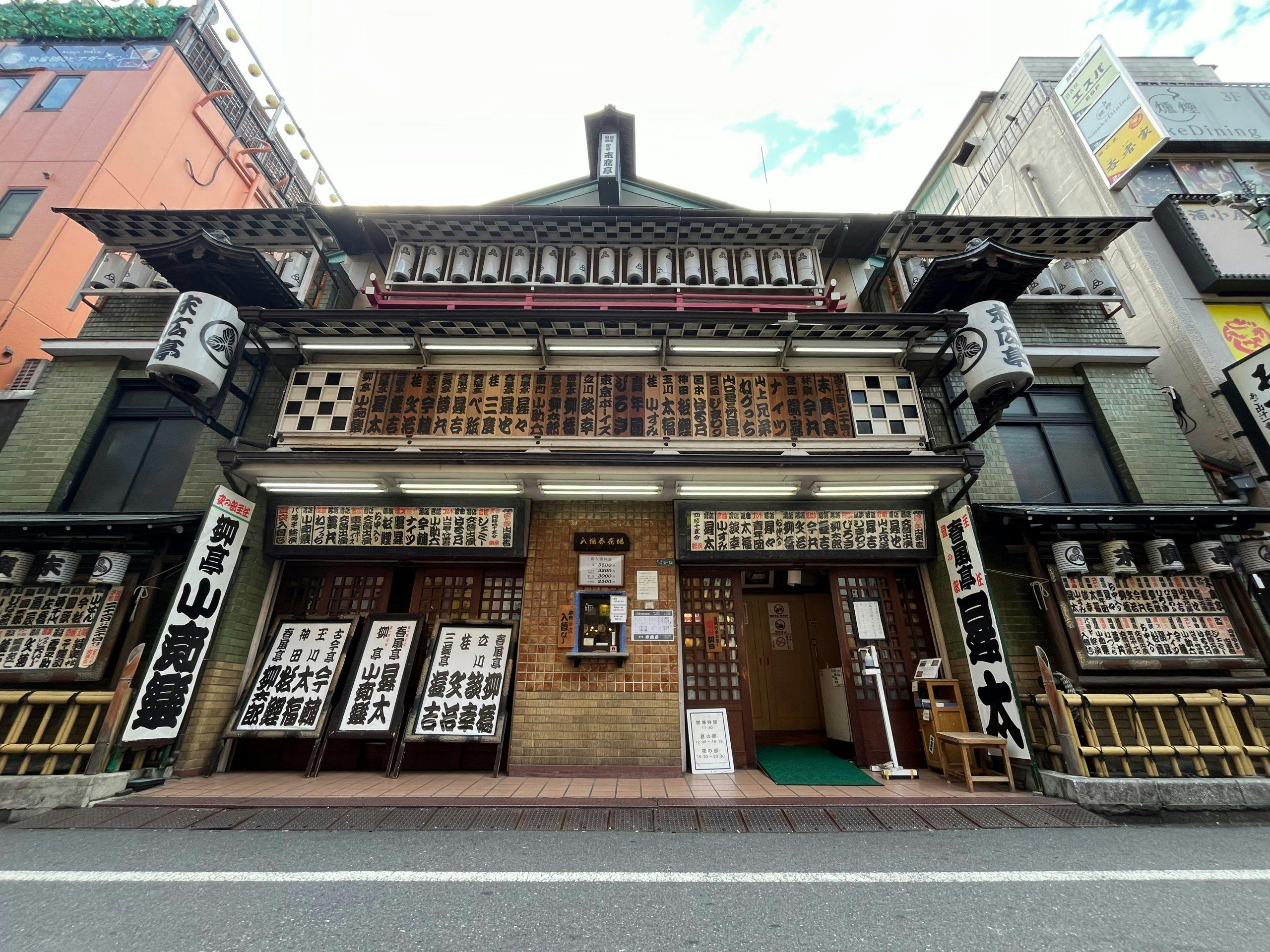
Rakugo involves a single storyteller kneeling on a cushion, elevated on a dais, offering their own take on classical stories determined by the season. The only props they are allowed are a collapsable fan (sensū) and a handkerchief (tenugui).
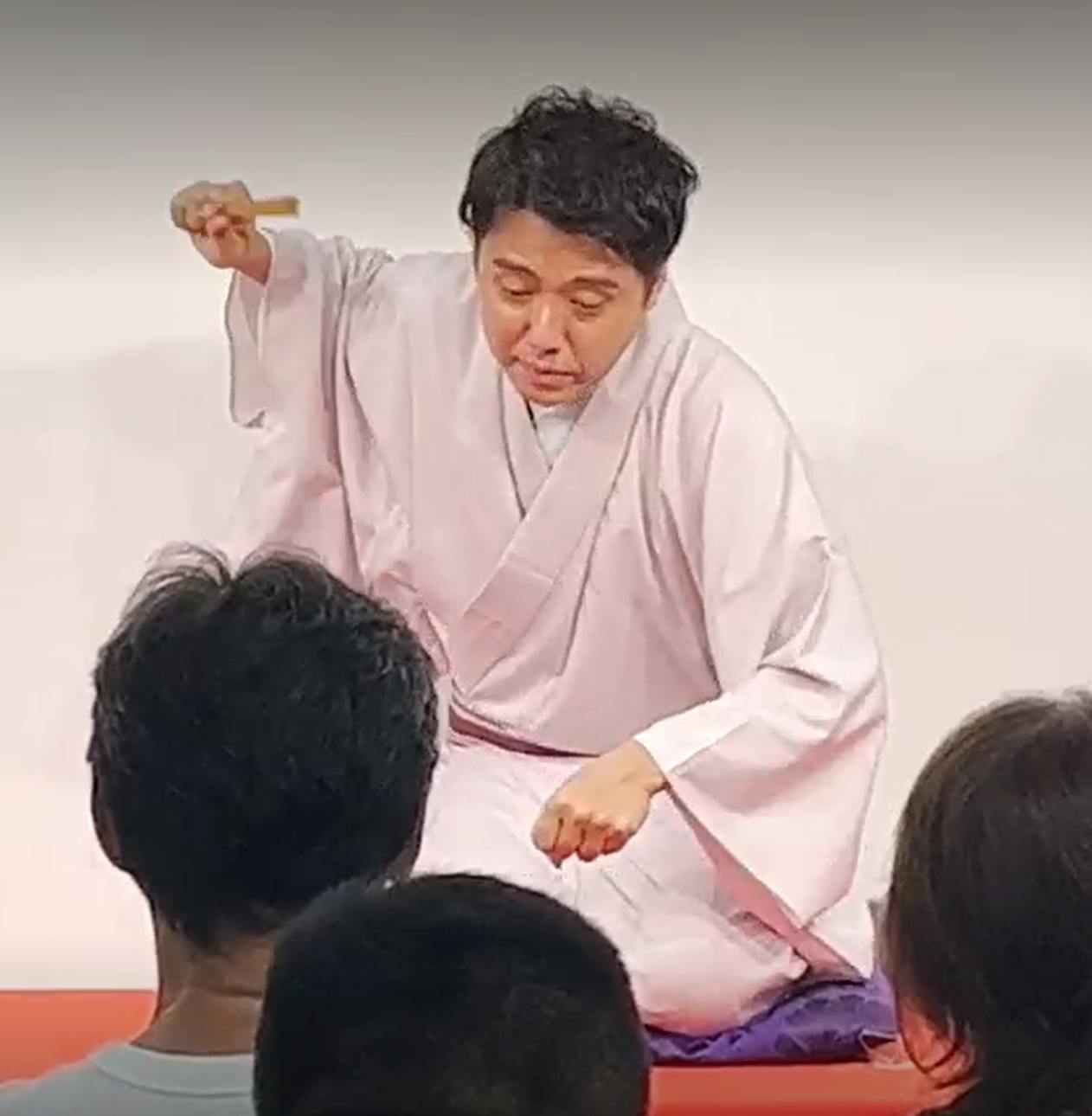
The comedian I saw, Yanagitei Shigaraki, told four stories: a perfect mime of trying to get hold of slippery eels; a fantasy about a Dad who takes his child to school in a pram and ends up flying like Pegasus and winning a horse race; a story about an idiot on his first day selling cabbages, and finally a meta-Rakugo about switching personas. If you have the impression that this is a whimsical heritage re-enactment don’t be in any doubt: Shigaraki gave a high-octane and surreal performance that was relentlessly physical.
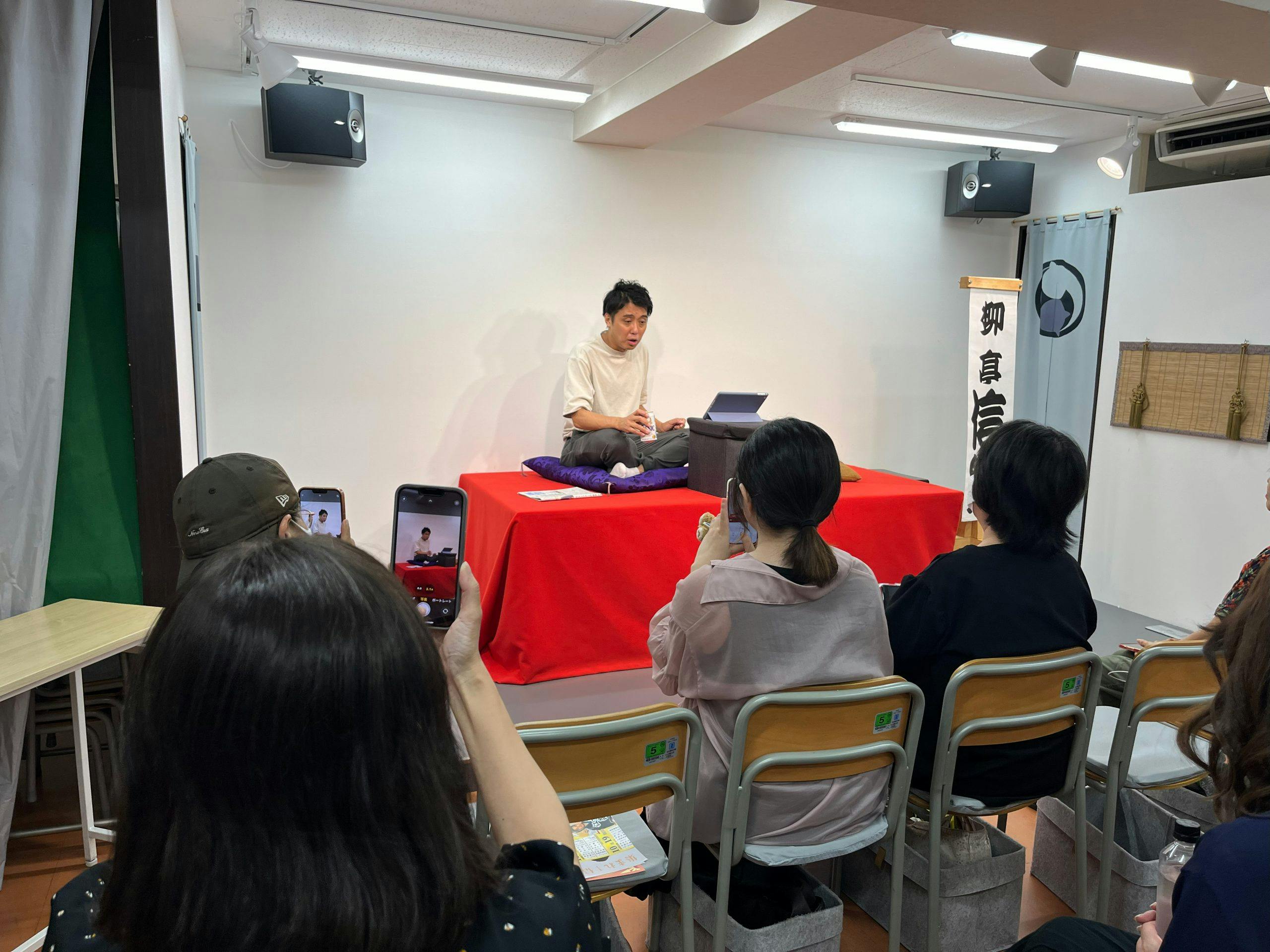
Exploring the underground theatre scene and Rakugo performances in Japan was a glimpse into Japan’s artistic heritage. Visiting Japan is comparatively cheap right now, so if you can go, be sure to check local listings for performance schedules and special events. There are several small, independent theatres across Tokyo presenting experimental performances or exhibitions. The following venues regularly programme contemporary theatre, and the websites have English versions:
Scool Theatre
Buoy Theatre
Kichijōji Theatre
For more blogs from Richard Talbot, check out here and here.
GUESS THE TECHNICIAN!
Which staff member starred as Cinderella in their school musical? Find the answer at the end of the newsletter!
SALFORD STUDENTS PARTAKE IN RESIDENCY WITH ESMAE ACADEMY PORTO!
Written by Brainne Edge and Paolo, Alfie, Peter, Rose, Alex, Ethan
Five L6 Theatre and Performance Practice students are taking part in an exciting international project for their L6 Theatre Project this winter.
Module Leader Tracy Crossley tells us: “The field trip is a week long residency where our students present their work, engage in feedback conversations and take part in workshops and other cultural activity with Acting students from the ESMAE Academy . This will also involve students from Arden School of theatre Manchester and Rose Bruford College of Theatre and Performance.
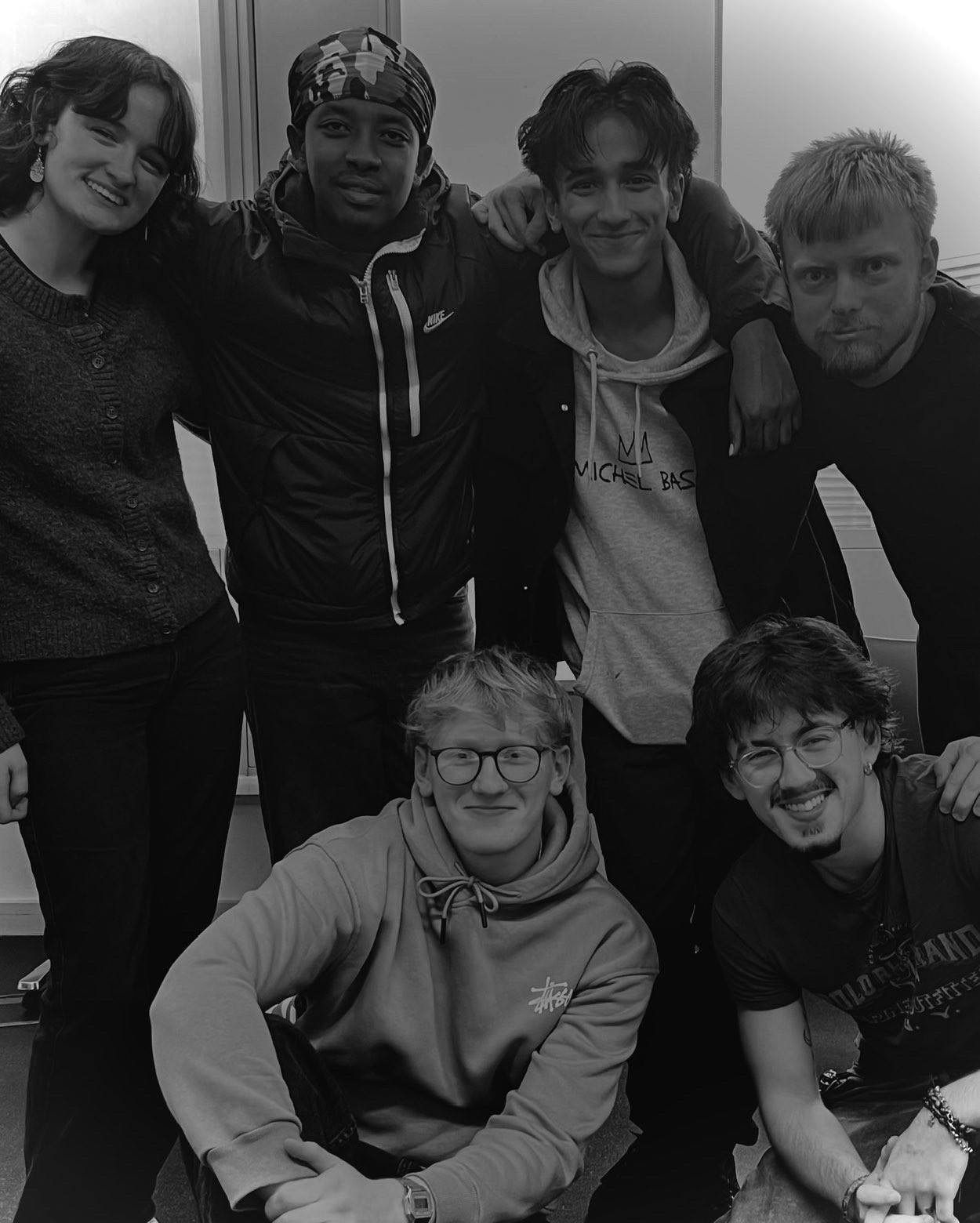
This is a pilot year, and the students will make a piece of devised work which they will share with students from other institutions, including Esmae and other European institution.
The week of cultural exchange in Porto will include performances from each of the participating 4 groups, intense feedback sessions, daily workshops with staff and students in body, voice, play, opportunities to experience inhouse Portuguese theatre work.”
What is the piece?
It is a devised collaborative piece in response to our stimuli of the Universal Declaration of Human rights. It is heavily inspired by Monica Ross’s work Acts of Memory. Through our deeper collective research, we have chosen to focus on the long-term impacts of the declaration and how it’s affected the modern society we know today. Coming from a generation that are ignorant to its existence, we wanted to discover the true meaning of what our individual, human and political rights mean – in context of their origins. Throughout the entire process however, we have sustained the awareness that we’re performing in an international space, where these “rights” may vary – so we aspire to build bridges with these different cultures within this foreign exchange, with the hope of creating a level of understanding and consciousness.
What is your input?
It incorporates a multitude of interdisciplinary forms of performance, as we all come from different experiences of life- both within our time at university and prior. As a close-knitted ensemble, we are not afraid to shy away from our differences and our individual uniqueness. In this piece we give space to purely present offers to the audience – about ourselves, how we explore each other’s backgrounds, and how we discover the connections between them.
What will you get out of it?
The experience of performing within an international context – whilst also the experience of just being surrounded by a different culture, which none of us have witnessed before. During our time there, we aim to work/perform in a collaborative manner in hopes of forming connections which light the spark of new conversations that need to happen.

RITUAL, ANCESTRY AND THE BODY – ATTENDING BALKAN EROTIC EPIC!
By Hannah Briggs and Dr Ali Matthews
In October I had the absolute joy of attending Balkan Erotic Epic by Marina Abramovich, a 4-hour durational immersive performance at AVIVA Studios, Factory International. Across ten days of performances, the “ritual” explored “where ancient myth meets performance art”, investigating “eroticism, spirituality and traditions of Abramović’s homeland through 13 visceral scenes”.
A cast of over 70 performers, dancers, musicians and singers brought together these variable and intersecting scenes that delved into ancient Balkan folklore, utilising dance, song, ritual and physicality. Audiences were free to come and go as they pleased, walking around different scenes at the leisure, which were all in the same space. However, every scene was designed to interlock with each other, fading in and out of change and climax; sometimes a scene on the opposite side of the space would burst with life, and you found yourself running over to see what was going on! It was exhilarating and deeply immersive. It became very clear that every experience of the 4-hour piece, even if one was to return, would be completely unique. There were so many details and subtle moments in every scene that were impossible to witness all at once (I tried to return for another night and found it sold out!).
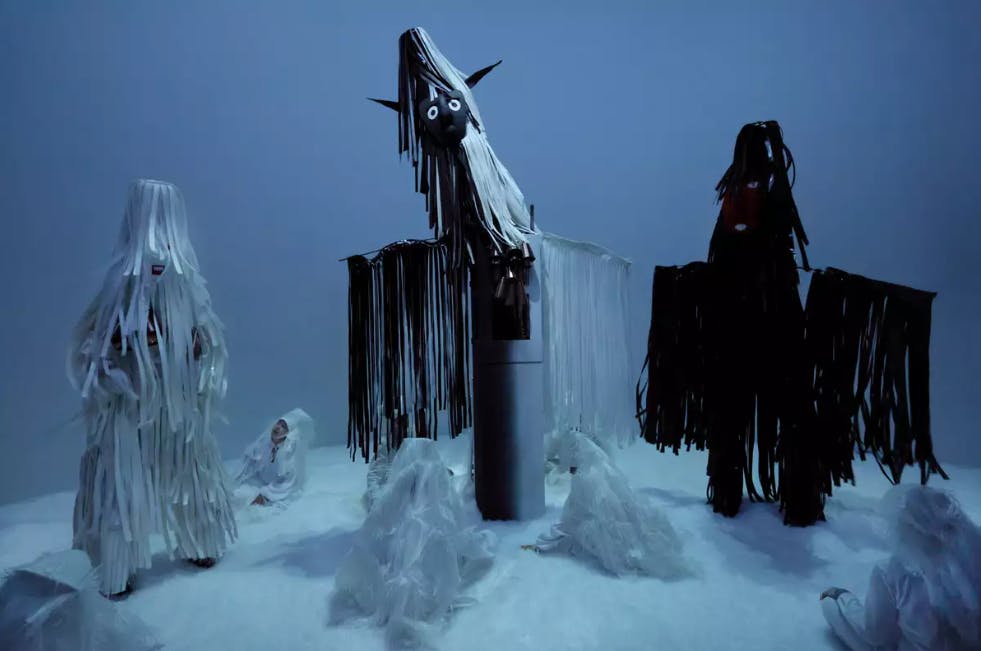
A few of the scenes included: “In Fertility Rite, bodies writhe against the ground in a desperate call for fertility. Witness Massaging the Breast where women gesticulate over graves to awaken the earth. In Scaring the Gods, women bare themselves to the sky to banish storms”. In particular, in a hidden back corridor (you only spotted it by chance!) lived Ancestor’s Dance, a scene where three performers, dressed as great Balkan mystical creatures, watched you carefully through a foggy window. Representing the presence of ancestors in the afterlife – “you feel their presence and hear their rhythms, but they’re unreachable” – I found this scene so striking and powerful.
One performer in Scaring the Gods was the University’s own Dr Ali Matthews! I managed to grab her for some questions about being involved in the show.
How did you get involved in Balkan Erotic Epic? What drew you to it?
I auditioned and went through a formal casting process led by Factory International and the Abramovic Institute. I was drawn to the role through my existing interest in body-based endurance, folklore, ritual and performance art.
How did you find the rehearsal experience?
I found it really exhausting, joyful, thrilling and challenging. I built my skills as a physical performer, but also found new mental resilience and capacity for durational work thanks to a three-day workshop with the Abramovic Institute for us performers, entitled “Cleaning The House“, in which we undertook different durational tasks over hours.
There were, in total, ten shows across ten days, each of them four hours long. How did you pace yourself during performances and across the overall period?
I tried to show up as I was every night. If I was feeling tired, or angry, or fed up, or giddy – all of that went into the work. How can the work be a container for whatever feelings arise? How can I not ‘act’, but still perform with intention, channel whatever I’m feeling into the moment? How is task a container for lived experience? These are the big picture questions I asked myself, and every night was a new answer. Also, I got extremely tired, found new reserves of energy, and performed with the flu – all in turn 🙂
What do you feel you’ll take away from this experience?
I’ll take away a renewed appreciation for dancers and physical performers and their disciplinary training, as well as gratitude for being in a production so ambitious and challenging. I’ll take away a new sense of performance endurance – I’ve done a show recently that’s 75 minutes, and that now feels like a breeze! I’ll take away a loving network of artists from around the world, and hopefully I’ll keep learning – I’m touring with the work starting in January in Barcelona.
Thank you to Ali for answering my questions! For me, Balkan Erotic Epic was an entirely unique, ambitious and deeply moving experience. It made me consider the deep folklore roots of human culture and, despite our superficial denials, the eternal way those superstitions, desires and artistry persist in modern society.
BETWEEN EARTH AND VOICE
By Chloe Gorrod
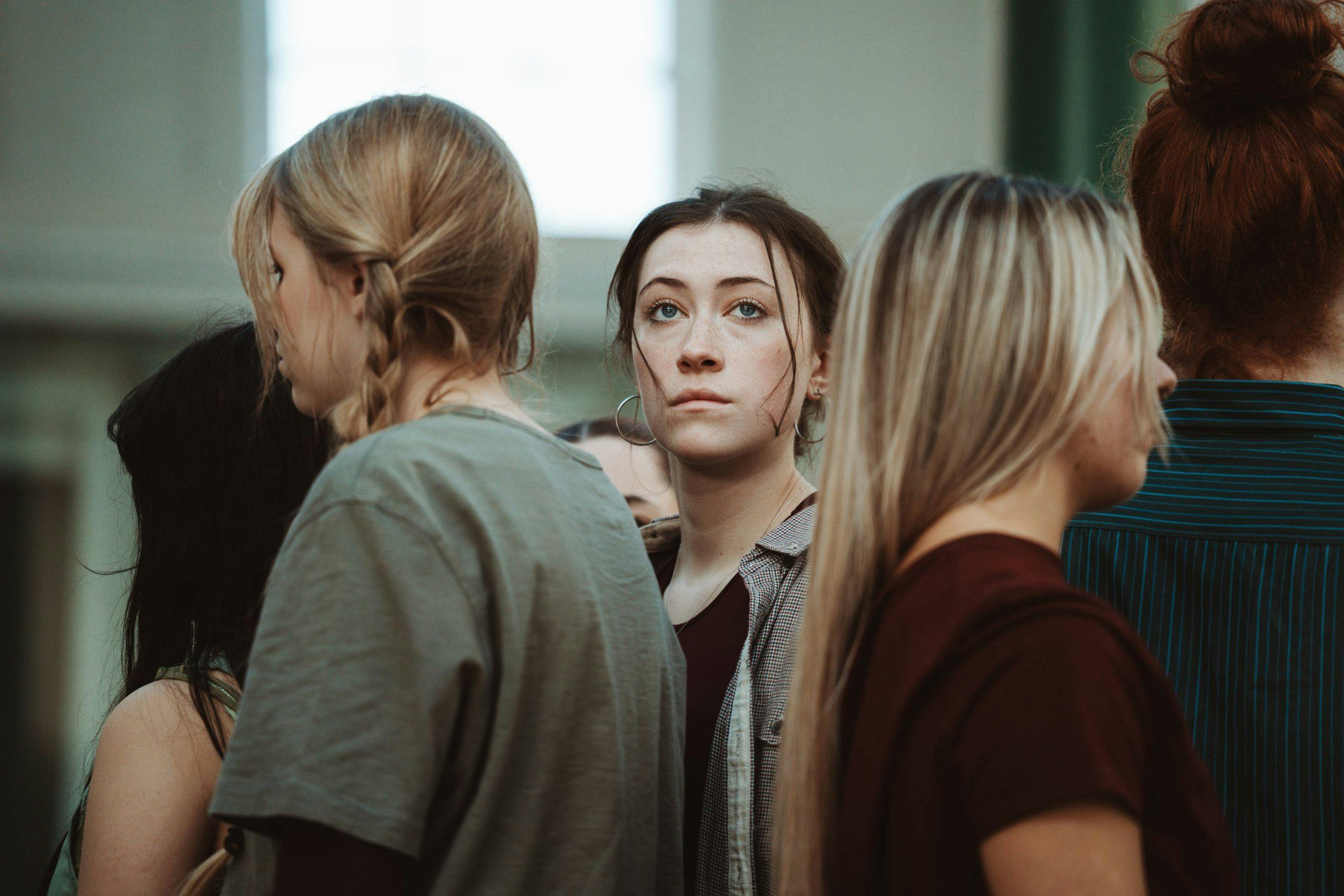 Between Earth and Voice was a piece created by three young people (two of whom are first year Theatre/Media students) who saw a gap in the industry for young people to be taken seriously, given creative control, and paid fairly.
Between Earth and Voice was a piece created by three young people (two of whom are first year Theatre/Media students) who saw a gap in the industry for young people to be taken seriously, given creative control, and paid fairly.
After gathering a cast of around 20 young people who are all very skilled in their chosen area of the arts and passionate about a specific niche which may not be commonly demanded in the mainstream, we devised a piece which was centred around their talents and interests. This culminated in an hour-long celebration of original music, dance, spoken word poetry, carnival arts, percussion, techno, and movement where there was something for everyone. We discussed topics from time to feminism and what it means to move your body to beans on toast.
The rehearsal process felt very special to us, each rehearsal bringing something new and exciting, a fresh exploration of a completely original piece which had no rules or hierarchy and encouraged each member to explore their creative ideas to their full potential.
After an extremely tight turnaround, the piece took place in Stalybridge Civic Hall, a unique and challenging space – a blank hall with no lighting, no permanent seating, and only stone floors. However, we know what it can feel like to walk into a theatre or arts venue and feel as though you don’t belong, so what we wanted to do was to create a site-specific piece somewhere outside the traditional notions of theatre, so that everyone could belong and enjoy the shared sense of excitement.
We absolutely loved having the space to develop creatively and just have fun through a unique devising process and are extremely proud of the final performance piece. But we aren’t finished there! We are looking to take this forward in any way, potentially continuing the development of this piece and touring it to different venues, working with different schools and community groups to explore what being a young person and the arts mean to them, or any new, undiscovered versions of Between Earth and Voice. Anything is possible and welcomed.
We are always open to connecting with young people and creatives in any strand of the arts as we look to move forwards and continue to create as a collaborative and friendly collective of passionate young people. If you have a passion or particular skill, we will always be happy to hear from you!
Between Earth and Voice 2025 was a huge success so we look forwards to our next opportunity to create!
Between Earth and Voice Instagram
This project was possible thanks to funding from the UK Government through the Flexible Local Authority Grants.
THE HERDS: A STAMPEDE FOR THE PLANET
by Dr Abby Bentham
From Kinshasa to the Arctic Circle, The Herds charged through city streets in a breathtaking global spectacle that fused art, activism, and climate urgency. Between April and August 2025, life-size puppet animals—including elephants, giraffes, antelopes, lions, and wildebeest—crafted from recyclable cardboard and plywood, stormed urban centres across continents, fleeing climate disaster and seeking sanctuary.
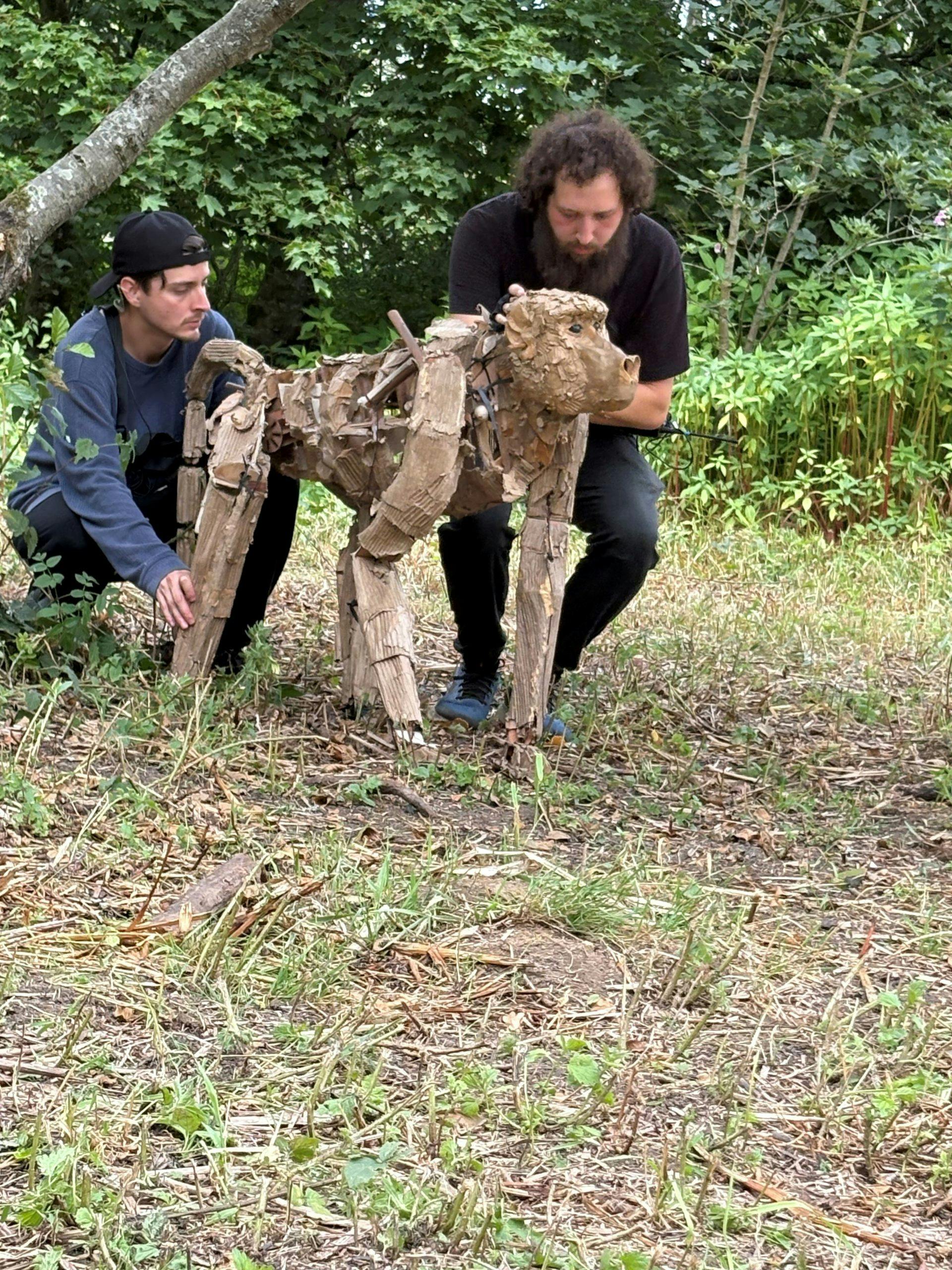
This wasn’t just theatre—it was a 20,000km migration designed to galvanise change. At every stop, new animals joined the journey, built by local communities in hands-on workshops led by master puppeteer Alison Duddle of A Bird in the Hand Theatre. I joined the creative stampede in Manchester—starting with articulated wildebeest legs, then constructing pepakura deer heads, and shaping antelope bodies. The builds were broken down into bite-sized tasks, making it possible for anyone to take part, regardless of experience.
The displaced herd, comprising 80 puppets and 120 puppeteers, arrived in Manchester city centre on July 3rd, just in time for the opening event of Manchester International Festival (MIF25). It then migrated to Heywood on July 4th before moving on to Pennington Flash Country Park on July 5th.
The Herds is the latest brainchild of The Walk Productions—the team behind Little Amal, the towering puppet of a refugee child that became a global symbol of hope. Led by David Lan, Tracey Seaward, Amir Nizar Zuabi, and Sarah Loader, The Herds united artists, students, and citizens worldwide in a powerful call to action: climate breakdown is real, and it’s already displacing life.
Have you ever wanted to see what a stampede for change looks like? This was it.
CATCHING UP WITH THE GRADUATE SCHOLARSHIP RECEIVERS 2025!
by Brainne Edge
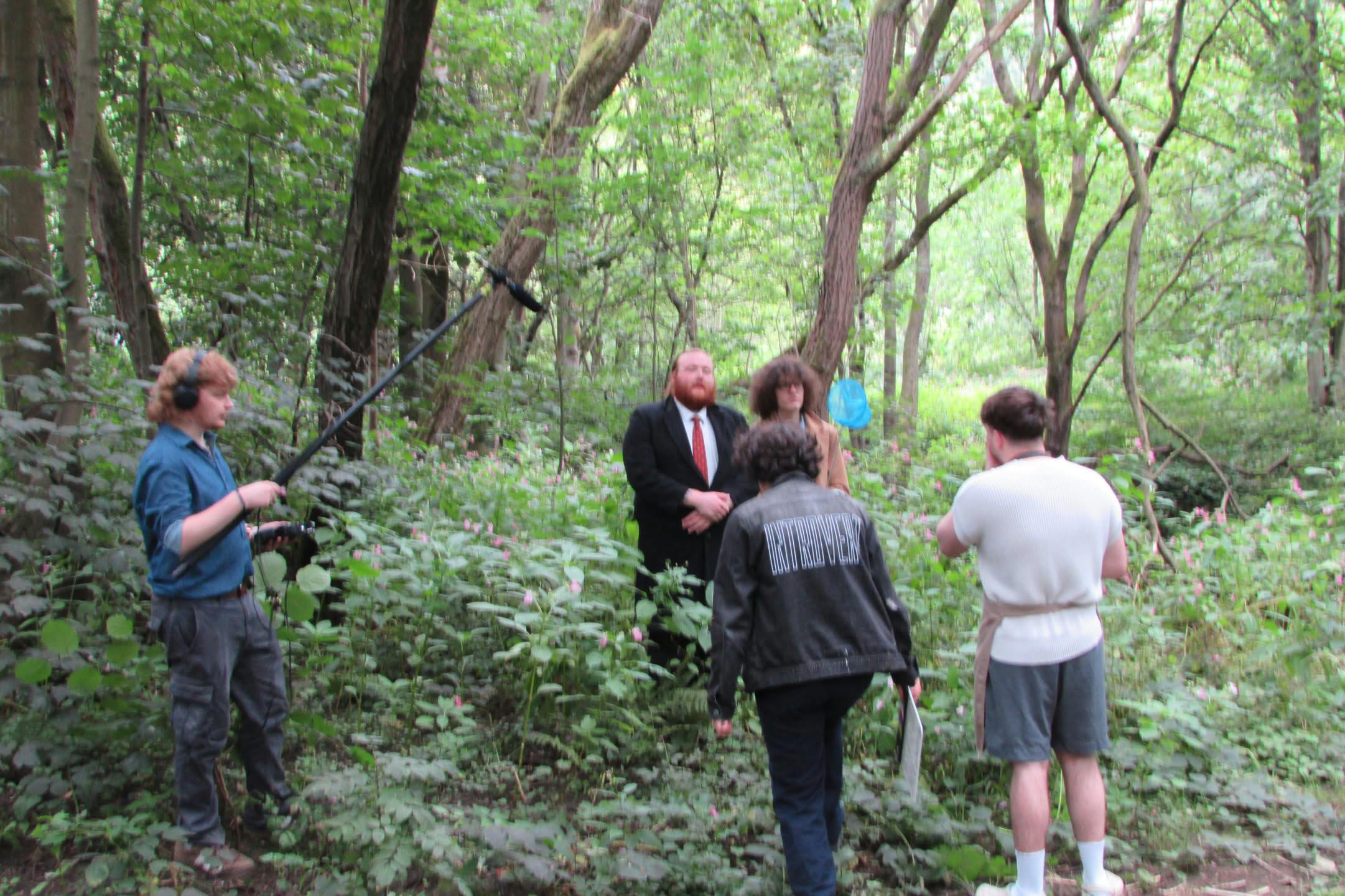
Each year the New Adelphi Theatre, and their donors, offer a number of Graduate Scholarship Awards. Last year’s recipients were Robyn Misha, Tia Nelson, Kieran Seddon, Andrew Blott and Robyn MacPherson. We hear from them four months into their Award time.
Robyn Misha says “Through the graduate scholarship, I have been lucky enough to be able to purchase film equipment that has left me in a great place for any films I make and any client based work. I have had the pleasure of doing some filming work for various companies, including Meadows Care, and being able to produce work that I am very proud of due to the equipment I was able to purchase with the scholarship. I am in the final stages of completing postproduction for a feature film that I have been working towards since mid-way through my initial degree, and that this scholarship has helped improve the editing process for (with a purchase of Davinci Resolve Studio and a speed editing keyboard). My current project that I am in preproduction for is a collection of radio dramas, of which I plan to use the New Adelphi Radio studios to record in. I will be eternally grateful for being given the opportunity to work further towards my dreams of being a full-time filmmaker, videographer and editor.”
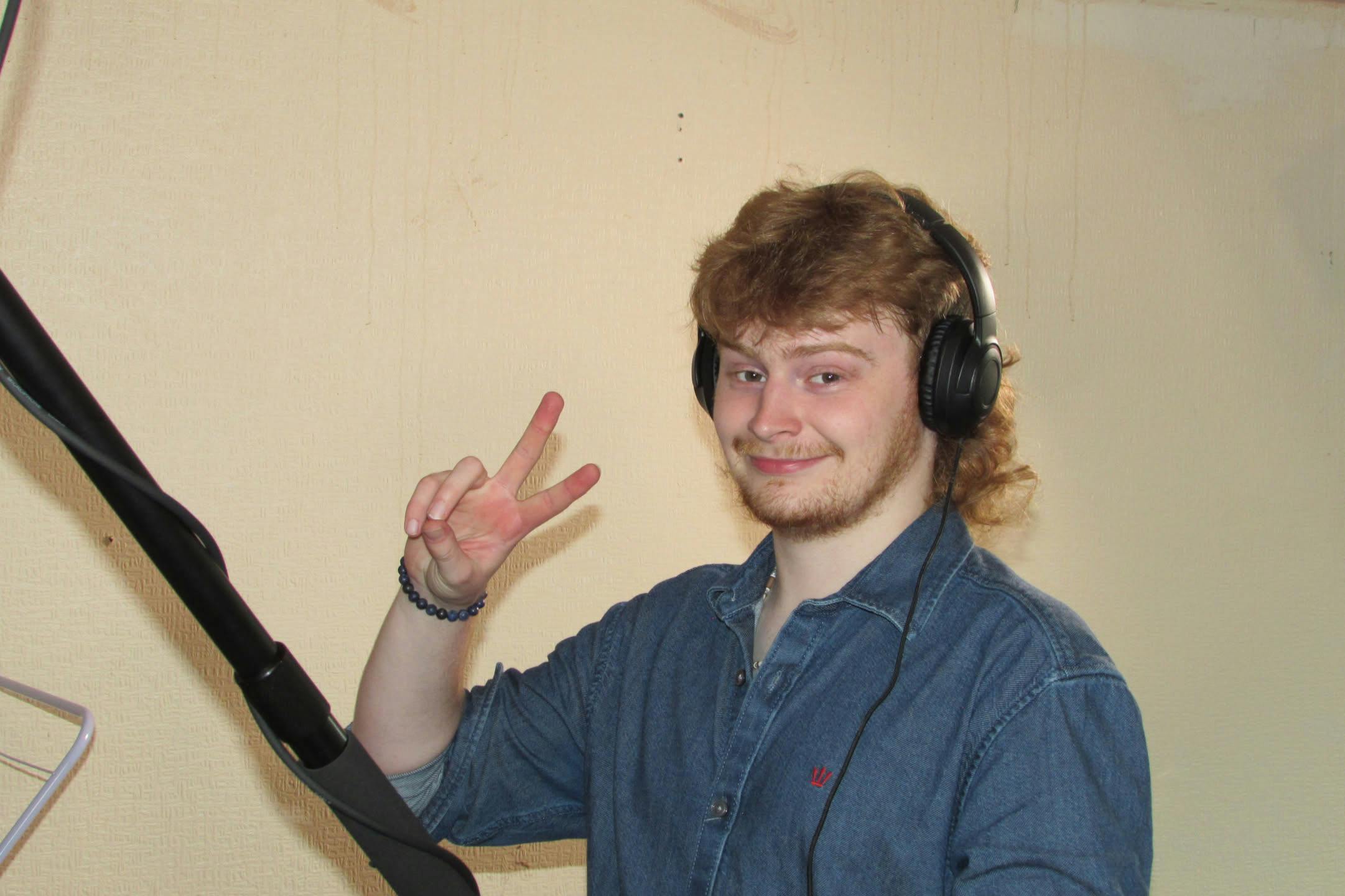
Andrew Blott lets us know: “I am continuing to develop and write my radio situation comedy Sordid and Stoned: A Legend Distilled. I will be attending the Big Comedy Conference in December which provides lectures and workshops and the opportunity to network with industry professionals. I am planning to set up a voice studio at home to enable me to record voice content – narrations and voiceovers.”
Tia Nelson fills us in: “As I draft up my script ideas I am continuing to study independently, I’ve been using my access to the library to read books on screenwriting and sharpen my literary skills. I have also began studying the 12 principles of animation and I am looking to find animation workshops/ courses so that I can learn how to storyboard my ideas . I’m hoping to be able to meet some animation students/ graduates who are interested in collaborating on a project . If all goes well, I plan on using the voice acting studios to record voice acting performances.”
Finally Kieran Seddon tells us: “I’m currently working on improving myself and pushing myself forward. From investing into some equipment for my own stand up gigs, working on hosting some more stand up comedy shows to personal investment like acting lessons to help me with continuing to grow and learn in the acting industry. I’m looking forward to getting back in that library and up to the rehearsal rooms.”
Looking forward to next year, applicants get to apply for a number of exciting elements to the Award. £1k to the recipient as their Personal Development Fund, to be used at their discretion to support their development. This can act as a fee for your time. £1k could be used for Coaching or Mentoring sessions. This might be for the recipient to invite an artist of their choice to work with them as Director, Dramaturge, Editor, for e.g., or for the recipient to complete a career development course or further training. The New Adelphi Theatre team can help the recipients find the most appropriate mentors.The remaining £1000 can be used as Performance Development, for e.g., to purchase tech kit, props, set build, travel, accommodation, etc. Recipients would be able to access rehearsal space at New Adelphi free of charge, subject to timetabling commitments and potential out of hours estates cost.
So keep it in mind for the 2026 Awards!
SPOTLIGHT ON TALENT: ‘FROM PAGE TO STAGE’ SUMMER SCHOOL INSPIRES FUTURE CREATIVES
By Dr Abby Bentham
This July, the University of Salford, in collaboration with Greater Manchester Higher, welcomed Year 10 students from across the region to the New Adelphi Theatre for a three-day Summer School experience.
‘From Page to Stage’ invited young people from underrepresented backgrounds to dive into the world of theatre-making — scripting, performing, and designing tech for a live show. The programme offered a hands-on glimpse into university life, while nurturing creativity, confidence, and collaboration.
Liam Shaw from the Widening Participation team reflected on the event’s impact: “It was so lovely to see all the young people throw themselves into the programme under the guidance of the academic staff, and to see how much their skillset and confidence developed in three days.”
The students clearly agreed. When asked how the programme could be improved, one enthusiastic participant replied: “Make it longer because 3 days was NOT ENOUGH! — other than that it was perfect.”
While staff led the sessions, the heart of the programme lay in the dedication of our Student Ambassadors, who supported every aspect of delivery. Their presence offered pupils a real insight into student life — and their kindness didn’t go unnoticed. “They were really kind and helped with anything that we needed,” shared one pupil.
Hannah Wilson, Widening Participation Manager, praised the collaborative spirit behind the scenes: “The programme exemplified partnership at its finest. Watching the learners progress from nervously sitting apart on day one to confidently performing a meaningful piece together was truly inspiring. The relationships formed throughout the journey were the real catalyst behind its success.”
This year’s programme built on the momentum of last summer’s ‘From Script to Screen’, which saw students create and film scenes for a continuing drama. Plans are already underway to bring the Summer School back next summer — and we’ll be recruiting talented Student Ambassadors to help make it happen.
Interested in getting involved? Keep an eye on Blackboard and your inbox in the coming months — opportunities for paid ambassador roles will be advertised as summer approaches.
SWORDS, STUNTS, AND STRANGULATIONS: FREE STAGE COMBAT COURSE PACKS A PUNCH!
by Richard Goodwin
Richard Goodwin, Programme Leader for Media and Performance, is currently running the first block of stage combat courses, made available free to students.
This is an 8-week course, which takes place every Tuesday evening throughout October and November and is designed to give University of Salford students a FREE introduction to stage combat (for stage and screen).
Students focus initially on unarmed dramatic combat (including punches, kicks, throws, hair grabs, strangulations, etc.) and then progress toward engaging in choreographed fight pieces with single sword and rapier & dagger.
To encourage collaborative opportunities, a group of MAP students will also be filming and editing the fight scenes for students to keep as a memory of their experience and proof that they survived!
If you would like to take part in the next 8-week block, either as a performer or as film crew, please look out for details to follow in the forthcoming weeks.

GREATER MANCHESTER THEATRE ROUNDUP!
by Dr Stephen Hornby
The Lowry
The Lowry is the major arts complex in Salford, with a large main stage (The Lyric), a second theatre (The Quays), a studio, a bar with great views, a restaurant and an art gallery housing L.S. Lowry’s world famous paintings. There is also a third space, the Aldridge studio whose progamme includes Vermin by Benny Ainsworth, a pitch-black psychodramedy about what we bury, what claws its way back, and what remains when we’re picked clean to the bone.
https://thelowry.com/whats-on/
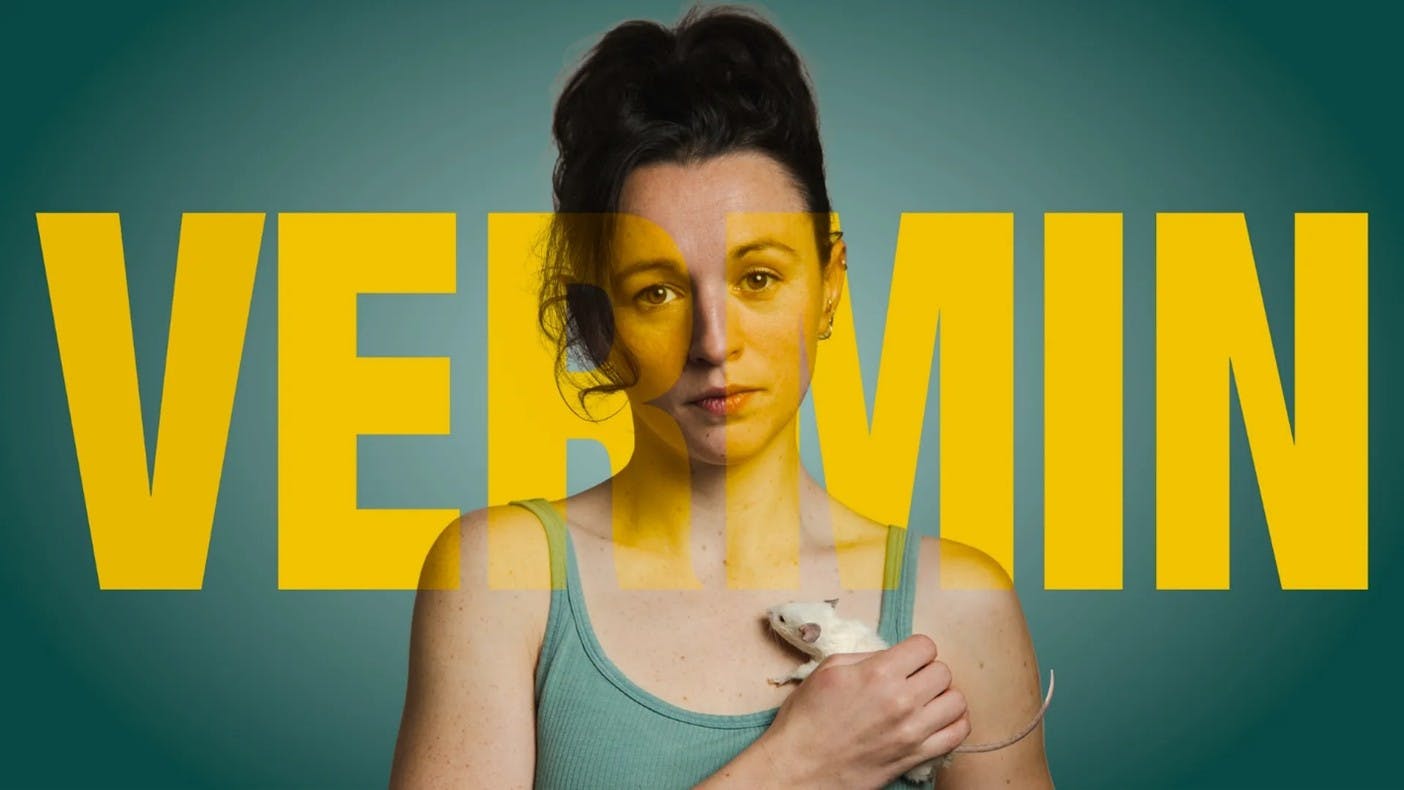
Royal Exchange
Manchester’s largest producing house and home of the prestigious Bruntwood Prize for playwriting. One highlight of this season is Jim Cartwright’s award-winning masterpiece Road which invites you to join the inhabitants of this derelict northern road on an unforgettable journey. Shockingly relevant to our lives today, the play’s visceral, eloquent poetry paints a tough world with tenderness.Directed by Artistic Director Selina Cartmell, this revival marks the 40th anniversary of the play.
What’s On & Tickets | Royal Exchange Theatre
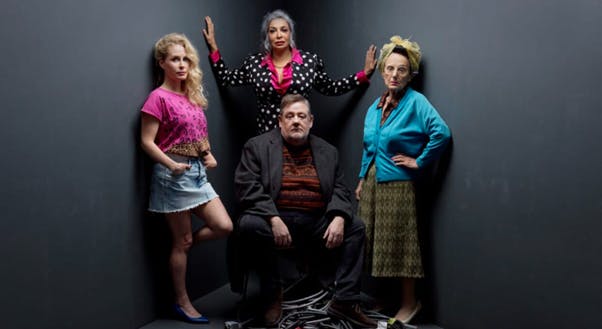
The Kings Arms
The Kings Arms is a fantastic pub with a studio theatre on the first floor. It’s also the home of the Greater Manchester Fringe Festival and a great place for student theatre companies to launch themselves from. From early December, they’ll be bringing the festives to their programme with a new adaptation of A Christmas Carol from David Thacker, who will also be directing the piece. David says, “I have edited the text carefully to create a ninety-minute show, but every word is written by Dickens. Nothing has been added or rewritten.”
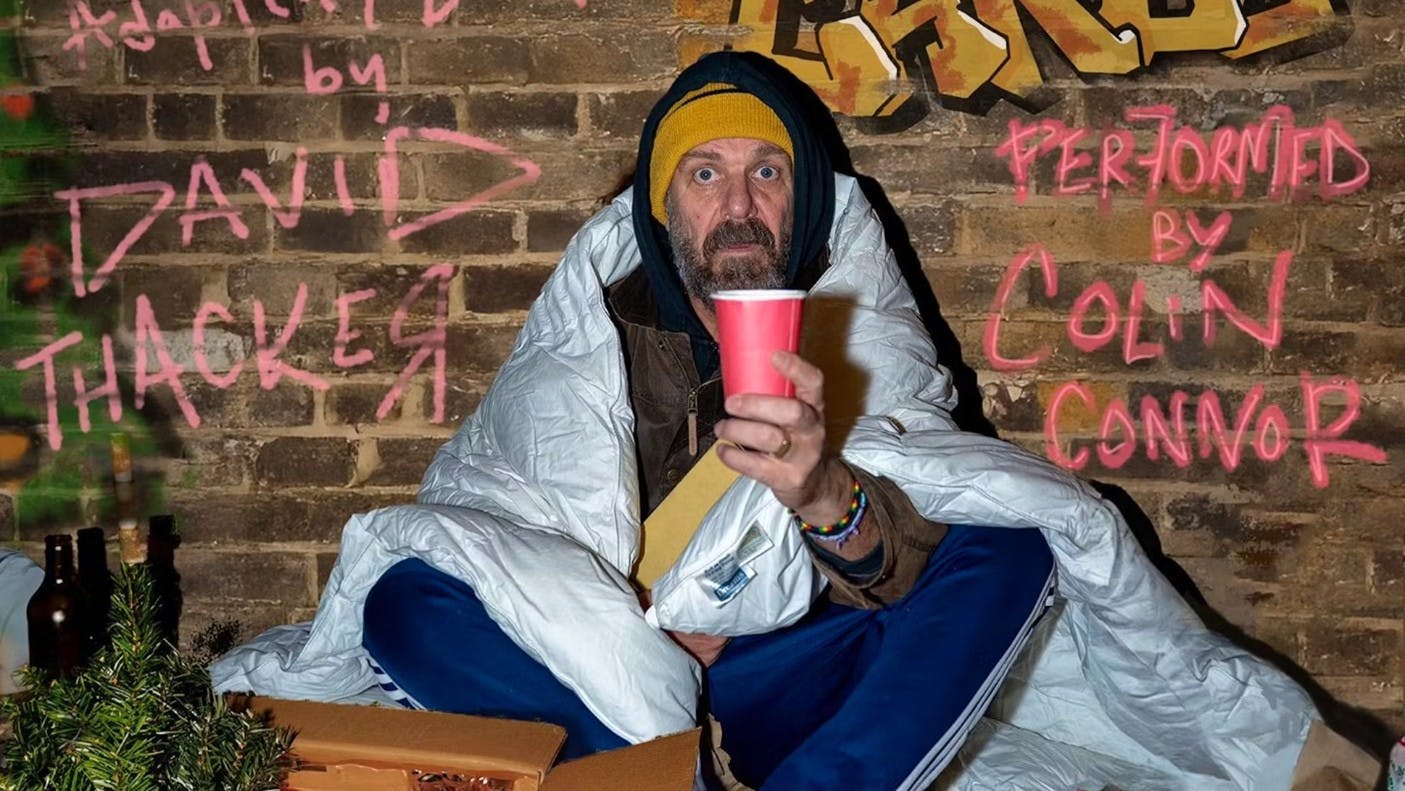
Please be aware that all these shows may have adult content and each venues webpage listings should be consulted for any specific content warnings.
WHAT’S ON AT THE NEW ADELPHI THEATRE!
by Hannah Briggs
HASBIAN
19TH NOVEMBER

A new Queer coming-of-age comedy about coming out as a lesbian, only to discover boys are also appealing! Beth’s real teenage diary is brought to life in vivid hilarity, with animated projections inspired by teen magazines, set to a soundtrack of Y2K pop classics and indie angst anthems.
Click here for tickets!
NEW ADELPHI COMEDY NIGHT
2ND DECEMBER
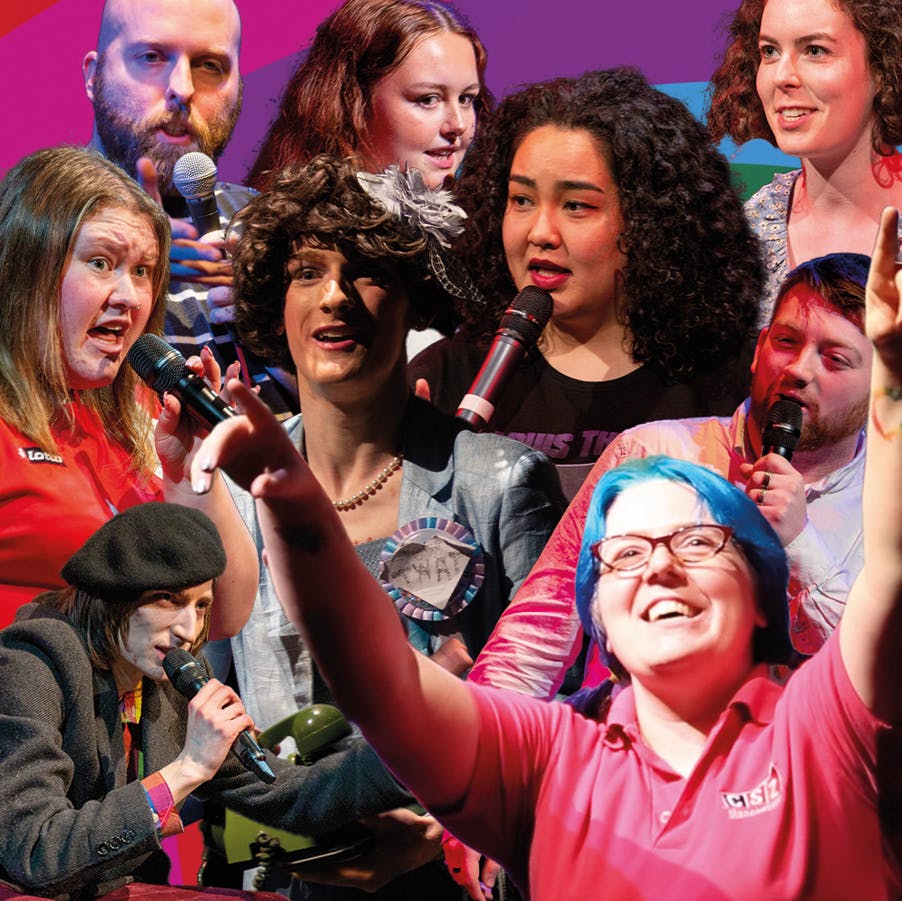
The award-winning Totally Improvised Company are back for a night of improv, stand-up and more! In the first half, professional improvisers and student guests will get the night going with gags and games inspired by your suggestions. In the second half, the stage is yours for an open mic with stand-up, songs, sketches and more! Previous line-ups have included award-winning student stand-ups developing material and launching their careers. Don’t miss your opportunity to catch the top talents of tomorrow… today!
Click here for tickets!
DEBUT
10TH – 11TH DECEMBER
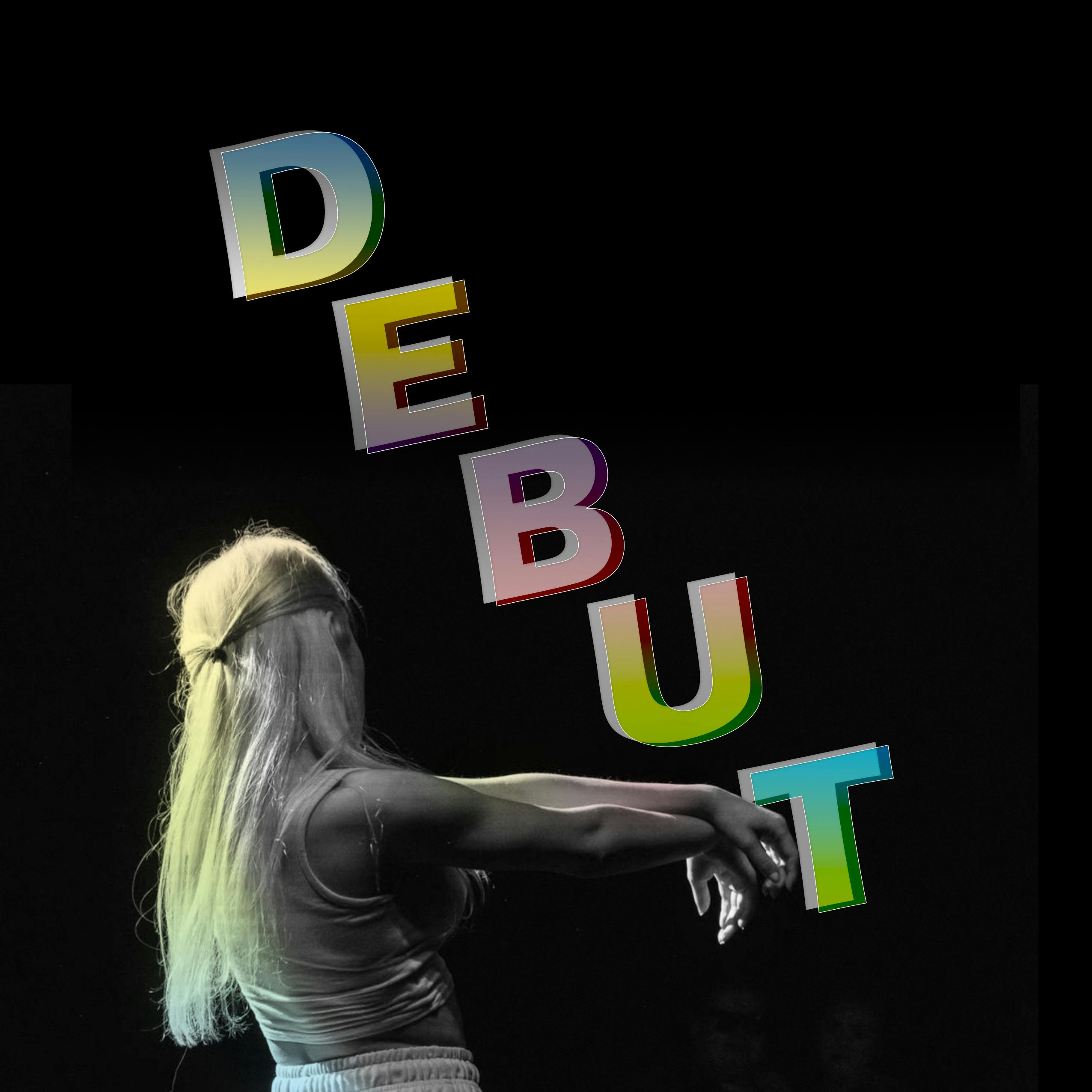
Final year Performance students prepare to launch themselves into the professional world; join us for their debut.
This festival of collaborative projects from students on the BA Theatre & Performance Practice, BA Technical Theatre, BA Media and Performance and BA Comedy Writing & Performance brings together a diverse range of work – including devised pieces, scripted plays, multimedia theatre, short films, comedy performances and more – in our New Adelphi Theatre and Studio spaces.
The line-up for Debut Fest and tickets will be launching over the next few weeks – so watch this space!
Click here for more information.

GAGS AND GUFFAWS AT THE NEW ADELPHI!
by Brainne Edge
The New Adelphi Comedy Night is a comedy event that runs four times a year in the New Adelphi Studio Theatre. The first half is an improv section featuring professional improvisers from award winning The Totally Improvised Company, and at least one student guest. The second half is an open mic and boasts a great deal of local talent trying out material and personas.
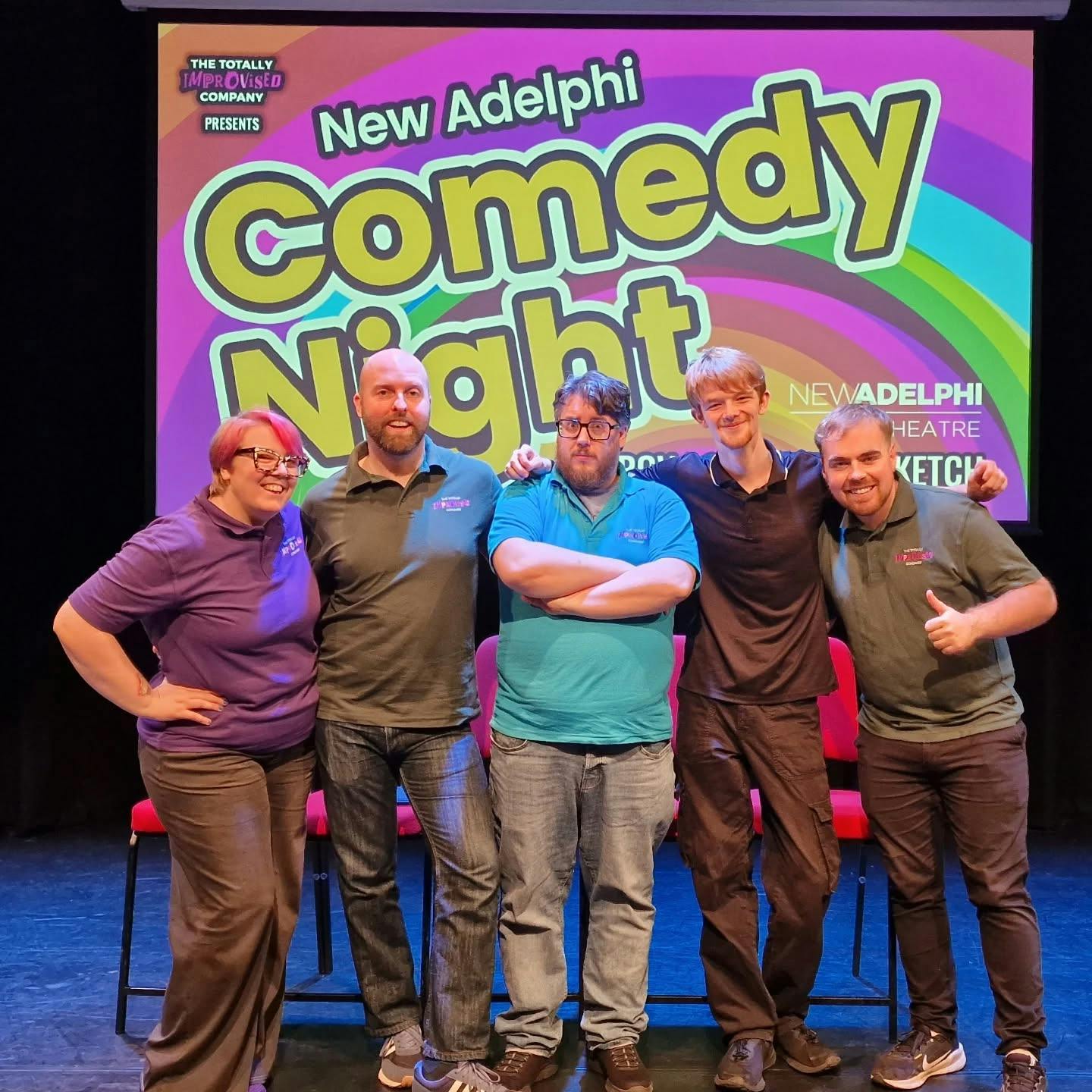
Our first show of the season was in October and featured L4 student Elliott Palmer, and a host of other students in the second half, some doing their first ever stand-up gig!
The second half is open to anyone to take part, and you get a whole 5 minutes to try whatever you would like out to an accommodating crowd.
The next show is December 2nd, and we are looking for both an Improv guest for the first half (get in touch if you’ve done some improv before) and people to perform in the second half.
Contact b.edge@salford.ac.uk if you’re interested in either section.
UNMASKING GENDER: POWER, IDENTITY, PRIVILEGE IN FILM
MediaCity, University of Salford – 10 December 2025
In the 1970s Anglo-American feminist scholars in a variety of disciplines began to explore the problematic representations of women in Hollywood cinema, issues and concerns over female spectatorship, as well as the history of women’s cinema in Hollywood and beyond. Two seminal works Marjorie Rosen’s 1973 Popcorn Venus: Women, Movies and the American Dream, and Molly Haskell’s 1974 From Reverence to Rape: The Treatment of Women in the Movies, pointed to stereotypical portrayals of women mostly in Hollywood films.
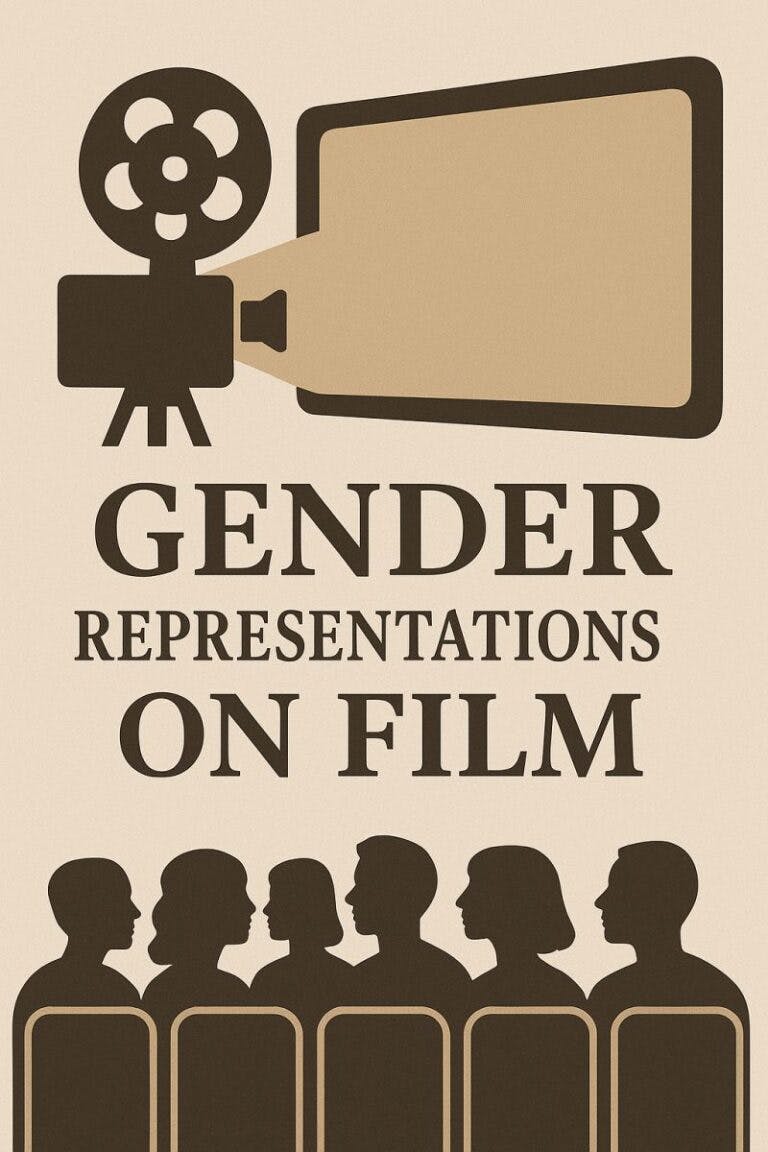
By end of the millennium, for cultural commentators like Susan Faludi (1999), it was curiously Western masculinity that had apparently reached an apocalyptic state. Its traditional markers – strength, a breadwinner status, social dominance, emotional self-efficacy and regulation – had been pathologised. In the wake of this sociocultural evolution, old jobs were lost; so-called masculine spaces once filled with miners, dockers and engineers were left barren or converted to penthouse homes and middle-management sites for the newly saturating white collar (so went the rhetoric), while the modern western male was increasingly under pressure to conform to commercial cultures of style, celebrity, and consumption. Ros Coward (1999) asked: when looking back on the achievements of feminism, “Is it now holding us back?” Is it demonising men and denying them the right to understanding and equality in a world that is perhaps far harsher for them than ever before?
Many years later, and in wake of the #MeToo Movement and the current sociopolitical climate that has seen Andrew Tate’s brand of hypermasculinity, misogyny and anti-feminism poll favourably in and beyond the ‘manosphere’, we believe there is an urgent need to re-examine gender in contemporary cinema. From researchers and scholars, from outreach initiatives to practice-based research among others, this one-day conference offers a diversity of approaches from a broad variety of perspectives on how film is grappling with contemporary portraits of gender in cinema in and beyond Hollywood. The event is free to attend and includes a keynote speech from Professor Kirsty Fairclough, School of Digital Arts (SODA), MMU.
GUESS THE TECHNICIAN – ANSWER!
Cinderella was played by our very own Charlotte Cropper!!


